BY ROSS BARKAN
Kathy Hochul won’t be able to breathe a sigh of relief for very long. In two short months, another legislative session begins, and both the left and the right will feel equally entitled to their pound of esh from the newly elected governor.

Left-leaning Democrats believe they made the difference in dragging Hochul to her narrow victory over Lee Zeldin, a Republican congressman. Moderates and conservatives, meanwhile, believe the congressman’s strong showing is proof the state must shift rightward.
In Albany, pandemic politics no longer dominate—there will be no talk of masks in schools or business shutdowns—and Hochul will arrive, for the rst time, as an elected governor. A new Legisla-
ture, still dominated by Democrats but shed of a few liberals and moderates, will be seated, and everyone will be free (brie y) to maneuver without the threat of an upcoming election.

For both the left and the right, the outcome o ers an opportunity for leverage.





Conservatives overall are crowing after Zeldin won 47% of the vote and ran up large margins on Long Island. He made signi cant inroads into the
Real estate has high hopes for moderate policies
BY EDDIE SMALL AND NATALIE SACHMECHI
Although a Democrat will continue to occupy the New York governor’s mansion following the Nov. 8 election, real estate players say the increased share of voters in the state who cast their ballot for the Republican candidate is telling, and they hope it signi es the arrival of more moderate policies for their industry.
Gov. Kathy Hochul bested Rep. Lee Zeldin last Tuesday, securing a full four-year term of her own after replacing former Gov. Andrew Cuomo last year and defying predictions of a Republican upset. She will continue to preside over a Legislature that the real estate industry has viewed with increasing frustration in recent years due to factors including the restrictive 2019 rent law and the recent loss of an a ordable housing tax break.
POWER CORNER Tom Grech on Queens’ ourishing entrepreneurial spirit PAGE 10 SPOTLIGHT Giant cookie maker Levain is picky about where it sets up shop PAGE 47 CHASING GIANTS MOBILE HOTEL SUITES MAKE LUXE TRAVEL CHEAPER PAGE 3 CRAINSNEWYORK.COM | NOVEMBER 14, 2022 NEWSPAPER VOL. 38, NO. 40 © 2022 CRAIN COMMUNICATIONS INC. PAGE 31 GETTY IMAGES
★ GOP GAINS:Several toss-up congressional districts went to Republicans (see page 16). Note: At press time, Brandon Williams (R) leads Francis Conole (D) in NY-22, though the race has not been of cially called. See HOPES on page 46 ★ ★ ★ POLITICS ★ ★ ★ ANALYSIS
Both left and right see opportunity for leverage See LEVERAGE on page 46
HOCHUL WINS: NOW WHAT?
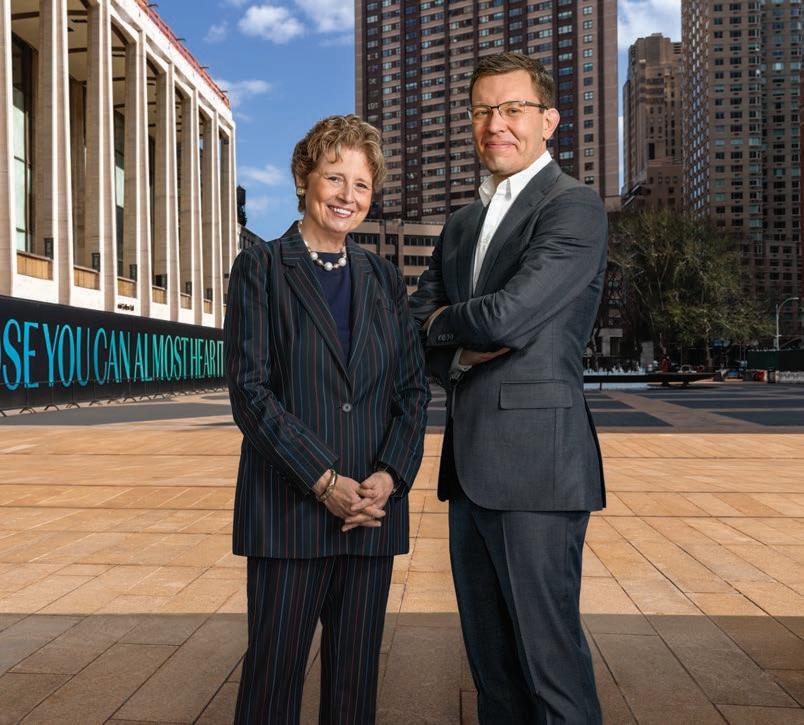
These siblings are pioneering a new kind of luxury hotel
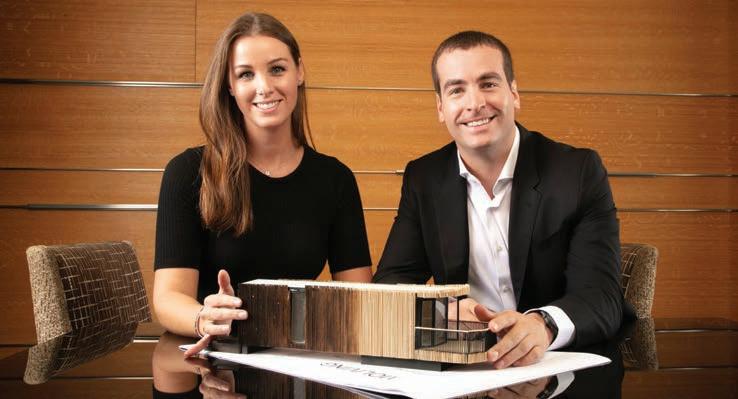
The upstart: Moliving
Several years ago Jordan and Hanna Bem, siblings who grew up in Paris, were relaxing seaside in the Hamptons, complaining (“as the French will do!” Hanna Bem says) about the high rates at the area’s ve-star hotels.
Why did a decent room in the Hamptons command as much as $2,000 a night in the summer? e problem, they concluded, was there was little demand most of the year. e hotels typically shut down in the o season.
But what if there were a way to move hotel rooms so they were always located wherever there is peak demand?
In the summer of 2021, the two launched Moliving, a Flatiron-based hospitality brand that seeks to reinvent the luxury hotel space. e rm has designed an upscale, stand-alone hotel room on wheels that can be easily transported between locations. ey plan to partner with landowners to open Moliving-branded sites across the country. e sites will share a large pool of these mobile hotel rooms, adding or subtracting units based on seasonal demand.
A planned site in the Hudson Valley, for example, will likely see low demand in the winter months along with “mud season”—March and April. Units could be moved during that period to South Florida, which typically sees higher demand in the winter months, peaking in March.
Jordan Bem, the company’s founder and CEO, who has a background in private equity and real estate—including a long stint working for his family’s Luxembourg-based development rm—backed the enterprise with $7 million from his own pocket. “We are in a very fortunate position that we were able to do that,” he says. “But we are also in a position where we know this is going to be a huge success, because it’s something that’s necessary for the market. So we were comfortable enough to actually put all our eggs in that basket.”
Moliving says that by year’s end, it will close on a seed round of about the same size—this time funded by outside investors to support the launch of its rst half-dozen locations in the next several years.
The reigning Goliath: Four Seasons Hotels and Resorts
e Toronto-based luxury brand manages 122 hotels and resorts in addition to 48 residential properties in 47 countries. It employs more 43,000 sta ers and executives.
How to slay the giant
Moliving is partnering with property owners who will provide the land along with permanent amenities, such as a spa, gym and restaurants. Moliving will provide the hotel rooms and run the operations, sales, sta ng and marketing. It will split the pro ts with the landowner.
Because the concept is new, Moliving had to design the mobile units from scratch. Each unit, constructed in an Oklahoma factory, costs between $150,000 and $200,000 to build, compared with the $800,000 to $1.2 million per unit it costs to build a traditional luxury hotel, Jordan Bem says. at savings—plus the ability to move inventory based on demand—will allow Moliving to o er a ve-star experience at a signi cant discount. For example, the $2,000 room in the Hamptons might cost $1,300 a night at a Moliving location, he says.
e current incarnation is a 400-square-foot room on wheels with a built-in front and back deck that provides 650 square feet of living space. e bedroom faces a wall of oor-to-ceiling glass. e units include all the amenities you would expect in a ve-star room, Jordan Bem says, including Wi-Fi, smart TVs, a bathroom with a rain shower and a heated oor, a private bar, an espresso machine and Devialet speakers.
e company says it has so far had three model units constructed. One is on display in Hurley. is Ulster County location, Moliving at Hurley House, was supposed to see the opening of a 60-unit site during the summer, but construction issues delayed the launch until next spring.
e stumble, however, hasn’t scared o potential partners. Five more sites—most on the East Coast—are slated to open in the next few years, sharing a pool of 400 mobile suites. e company gets more than 100 applications a week from prospective partners, Jordan Bem says.
Moliving is bringing on industry experts to help propel its growth. Its sta of 10 now includes head of hospitality Agustin Desintonio, a 38-year hospitality veteran who started at the Sheraton Times Square, helped open the rst W Hotel in Manhattan and served for a decade with the Four Seasons.

Hanna Bem, the chief marketing o cer, says Moliving is relying mainly on hospitality and design competitions, PR and in uencers to gain notice and demand.
“ at’s also a way that we have gotten a lot of inquiries for di erent pieces of land,” she says.
The next challenge

Paul Galvin, CEO of SG Blocks, the Jacksonville, Florida, company that is handling the construction of the mobile units for Moliving, is the lead investor in the current seed round. Galvin says the task of launching six locations will present a challenging puzzle: Moliving will have to execute in the right order—based on climate and geography—decide how many units are going to occupy each site and determine precisely when to move them around.
“ ere are beach hotels, snow hotels, lake hotels,” he says. “You don’t want to launch your beach hotel in the snow.” ■
Kadet is the creator of Café Anne, a weekly newsletter with a New York City focus.
NOVEMBER 14, 2022 | CRAIN’S NEW YORK BUSINESS | 3
Anne
BUCK ENNIS
mobile rooms on wheels aim to provide a ve-star experience at a lower price CHASING GIANTS
Moliving’s
ANNE KADET
MOLIVING’S co-founders say they will close on a seed round by year’s end.
Investor aims to sell Park Avenue home at a loss
BY C. J. HUGHES
Atwisting tale of love, po lice procedurals and very expensive penthouses may be about to close a chapter on the Upper East Side.
Tech investor Daniel Benton, founder of hedge fund Andor Capi tal Management, listed a four-bed room prewar duplex at 730 Park Ave. The asking price for the 5,200-square-foot apartment, No. 19-20C, is $35 million. The unit fea tures five baths, a living room with a fireplace, and a wraparound ter race.
Benton bought the apartment with his wife at the time, then Anna Benton, for $39 million in 2012. At the time the couple also owned an
$35M
spite its industrial roots, the build ing at 275 W. 10th St. offered the kind of apartment that Benton seems to prefer—penthouses— courtesy of a luxury condo conver sion undertaken by the sponsor Naftali Group.
The couple’s penthouse there, No. PHC, a 6,000-square-foot du plex, features five bedrooms, five full and two half-baths and a 1,500-square-foot terrace. It cost $35 million, according to records.

2016, DANIEL BENTON BEGAN DATING ACTRESS STEPHANIE mARCH
other large apartment in the build ing, No. 10-11C, which they had purchased for $21.5 million in 2007, according to tax records. They downsized a few years later by sell ing the extra apartment at a loss for $19.4 million.
Much bigger changes were on the horizon, however. In 2016 Ben ton, newly divorced from Anna, be gan dating actress Stephanie March, best known for playing a district attorney on the crime series Law and Order. March had recently broken things off with her spouse, the celebrity chef Bobby Flay.
In 2018, after the two remarried, Benton and March headed down town, where they found a home in a different kind of building: an 1896 brick-and-granite former ware house in the West Village. But de
REAL ESTATE
Benton and his ex-wife, now Anna Nikolayevsky, appear to have kept joint ownership of their Park Avenue spread for a few years. But in 2019 Nikolayevsky—who runs a hedge fund of her own, Axel Capital Manage ment—sold her half to her former husband for $17.5 million, giving Benton full ownership, records show. That’s the apartment that’s now for sale.
Benton, a former technology an alyst for Goldman Sachs, founded Andor in 2001 and a few years later claimed to manage almost $10 bil lion worth of investments, accord ing to news clips. But the Great Re cession pummeled the firm’s holdings, forcing Benton to shut down Andor in 2008 and return money to investors. Benton did re vive Andor a few years later, al though the firm appears to have been inactive since 2016. John Burger, the agent with Brown Har ris Stevens marketing No. PH 1920C, declined to comment. ■

Despite boom, some trophy homes struggle to sell
BY C. J. HUGHES
In the spring of 2020, as Covid was beginning to slam New York, Paul Yablon, a hedgefund executive, made a big wager. Despite a real estate market being roiled by a pandemic, he bet somebody would pay $42 million for 730 Park Ave., No 10-11C, his Upper East Side home.
But more than two years and several discounts later—the unit was reintroduced recently with a different agent and a new selling price of about $30 million—a buy er has yet to show up.
Obscured by some of the rosier headlines about the market’s re bound since the pandemic’s dark est days is the fact that some tro phy homes have struggled to find
takers, even as other homes have flown off the shelves.
Whether a function of picky coop boards, strict financing require ments or the limited audience for ver y-big-ticket proper ties—or perhaps just un realistic pricing—some co-ops and condos can seem to have missed out on the 2021-22 boom.
Although some of the stragglers are located uptown—in prewar coops on the Upper East and Upper West sides that often require allcash purchases—geog raphy appears less of a common bond than steep prices.
room co-op that came on the mar ket at about $40 million in 2018 and is listed at $30 million today.
Similarly, there’s 15 Central Park West, No. PH41, a three-bedroom condo with a terrace and 13-foot ceilings. It, too, was unveiled with the pandemic, in March 2020, when it sought $48 million. But it’s at $45 million now.

0NUMBER OF CONTRACT S signed in October for co-ops priced at $20 million and above
And 25 Mercer St., No. PH, a four-bedroom con do, arrived in 2018 at $28 million and is seeking $23 million currently, though it was rented for a while in 2021 at $65,000 a month.
and a staff suite across two floors, in a prewar building that’s consid ered one of the most prestigious on the Upper East Side.
Yablon, an alum of the hedge fund Moore Capital Management, created the apartment by combin ing two adjacent units, which to gether cost about $26 million in 2014. The cur rent asking price would seem to allow Yablon to come out ahead, though the apart ment does appear to have under gone an expensive renovation.
A different approach
Among the stragglers is 927 Fifth Ave., No. 9, a full-floor, six-bed
Aesthetics are not always want ing. Yablon’s stylish apartment, for instance, features seven bedrooms
And some of the sellers of the stragglers seem open to different marketing plans. Yablon’s apart ment, for instance, was offered previously by Corcoran Group and Compass, before landing with
In any event, the rarefied luxury sector may not be immune to the current slowdown. In October the number of contracts signed for coops at $20 million and above was zero, which was the same state of affairs a year ago, in October 2021.
Likewise, for condo units in the same price bracket, there were two deals in October, down from four a year ago, according to Elliman data, which showed similar dropoffs in September in both property types.
Noble Black, the Elliman agent now listing Yablon’s apartment, declined to comment. And an ef fort to get in touch with Yablon through Room40, his new cryptofocused investment firm, was un successful.
4 | CRAIN’S NEW YORK BUSINESS | NOvEmBER 14, 2022
RESIDENTIAL SPOTLIGHT
BROWN HARRIS STEVENS
The hedge fund founder Daniel Benton has listed his four-bedroom duplex in an Upper East Side building
PRICE for No. 19-20C at 730
Ave.
19-20C
LISTING
Park
NO.
AT 730 PARK AVE., a duplex with four bedrooms, spans 5,200 square feet with five bathrooms and a fireplace
IN
Douglas Elliman this month.
■
Not-for-profit strategies for tackling risk in a changing environment
ABOUT THE AUTHORS
EUSANIO
Partner
jeusanio@citrincooperman.com
For nearly three years, the only constant for not-forpro t entities has been change.
With the impacts of the pandemic, the return to work and migration to the new normal have challenged many organizations to pivot. Increasing costs, decreases in the supply of donors and volunteers, and now the potential for continued economic contraction have forced entities to adjust to the continuous waves of trials put before them. Not-for-pro ts are learning how to do more with less while remaining vigilant to emerging risks and new threats.
With so many internal, external and regulatory risks a ecting not-for-pro ts, where do they begin in tackling risk?
ENTERPRISE RISK MANAGEMENT


You cannot address the risks that a ect your organization without knowing what they are. When people hear the term “enterprise risk management,” they often think of a time and resource-intensive, overly complex process typically associated with larger for-pro t private or public companies.
is is not necessarily the case.
Risk management is the process of identifying, assessing and controlling threats to an organization’s assets or goals. ERM is a holistic approach to risk management that considers risk across the entire organization.

An ERM plan should be a proactive, multidimensional process of identifying, assessing, documenting and preparing for potential negative outcomes. Prioritizing between key events that are manageable and those that could harm or bring down the organization are important
Partner and Technology, Risk Advisory and Cybersecurity Practice Leader
mcamacho@citrincooperman.com
elements. e goal of such an assessment should be to reduce business and reputational impacts and aid the organization in meeting its goals and mission.
Key elements of a successful ERM process include:
• Scheduling the appropriate people and time: As mentioned, this is a multidimensional process. Including key members of each department within the organization is important. Making ample time to identify areas of concern, prioritizing the risks, discussing potential remedial activities to address them, and establishing the person or team for each action are key.
• Identify all risks: Focus on risks that could negatively a ect the organization’s operations, ability to raise funds or strategic direction. e initial discussion should put all risks on the table, regardless of how likely or unlikely they are to occur.
• Focus on most impactful risks: Once all the risks are identi ed, categorize and prioritize them to determine which could have the most negative impact on the organization and which are most likely to occur. Tools such as SWOT analyses, which look at strengths, weaknesses, opportunities and threats, and heat maps or risk registers are useful.
• Remediation: Discuss plans to address the identi ed risks and the person or team responsible for managing the resolution.
CYBERSECURITY RISK
One of the hottest areas of focus within an ERM program is cybersecurity risk. During the pandemic, hackers were picking up steam and taking advantage of already-strapped organizations that were trying to adjust to the
KEVIN RICCI
Partner
kricci@citrincooperman.com
employees to identify and avoid this threat. Every employee, including those being newly onboarded, should be provided with the training needed to recognize and avoid these attacks. Simulated phishing emails should be considered to augment the training.
• Resilience: e testing of disaster recovery and incident response plans is an excellent way to accelerate the response and recovery process and minimize the damage caused by a cyberattack. In addition to developing these plans, acquiring a cyber insurance policy to help blunt the many costs associated with a cyberattack is critically important.

INTERNAL CONTROL RISKS
new remote work environment and decentralization of people, processes and technology. Void of empathy and agnostic to industry, hackers used this opportunity to strike, morphing their traditional systems or hardware-based strategies to socially based tactics, focused on the weakest link of most organizations—their people.
e statistics tell the story of how rampant these attacks are as well as the repercussions should a data breach occur:
• Average cost of a data breach is $4.35 million
• Average number of days to detect and contain a data breach is 277 days
• 43% of cyberattacks target small organizations

• 82% of breaches involved a human element (phishing, misuse or error)
• 83% of organizations have had more than one breach
e following list of actions is a sampling of what an organization can do to harden its cybersecurity and reduce its chances of becoming the next victim.
• Cybersecurity risk assessments: If you do not know what data and assets you have or how well they are being defended, it is virtually impossible to protect your organization from cyberattacks. Completing a cybersecurity risk assessment will help you identify your most critical systems and data, recognize and prioritize gaps, and build a road map to a safer and more secure environment.
• Security awareness training: Since the genesis of more than 91% of data breaches is a spear phishing attack, it is imperative to train
As mentioned earlier, not-forpro ts are trying to maintain operations with fewer people wearing multiple hats. Finance departments, which were already strained to ensure proper segregation of duties, suddenly found themselves working remotely and performing duties that provide ample opportunity for error because of a lack of supervision or even fraud.
Organizations have several steps they can take to better protect themselves from the risks that de cient internal controls may bring:
• Perform an internal controls assessment: is is similar to a risk assessment in that you will not know you have an issue until you evaluate your processes and controls. Focus on processes that have access to cash or assets, that have cycles with signi cant amounts of change or that have one person doing many tasks.
• Implement positive pay: With increased check and wire fraud, what used to be a convenient feature o ered by banks is now critical. Positive pay involves providing your bank with a list of all checks issued, so that only authorized checks are paid. Positive pay should be implemented for all signi cant disbursement accounts.
• Strengthen controls related to changes in customer or vendor master les: All changes requested by customers or vendors to their master les should be veri ed
verbally via the phone number the organization has on le. Email requests should never be relied upon.
• Ensure proper segregation of duties: If any cash management functions are performed by the same person, restructuring should be considered or additional mitigating controls should be put into place.
• Perform timely completion of account reconciliations: Account reconciliations, especially for cash and other treasury accounts, should be performed timely after each period ends to detect unauthorized transactions.
e ability to navigate the ever-changing landscape of this post-pandemic world, which is lled with old and new risks and threats, needs to be top of mind for all not-for-pro t organizations.
A proactive and continuous approach will aid in ensuring the long-term sustainability and nancial health of your organization so that you can focus on what counts: your mission.
“Citrin Cooperman” is the brand under which Citrin Cooperman & Company LLP, a licensed independent CPA rm, and Citrin Cooperman Advisors LLC serve clients’ business needs. e two rms operate as separate legal entities in an alternative practice structure. Citrin Cooperman is an independent member of Moore North America, which is itself a regional member of Moore Global Network Limited.alternative practice structure. Citrin Cooperman is an independent member of Moore North America, which is itself a regional member of Moore Global Network Limited.



5 | CRAIN’S NEW YORK BUSINESS | NOVEMBER 14, 2022
SPONSORED CONTENT
MICHAEL CAMACHO
JOHN
and Not-For-Pro t Practice Leader
Broker behind eye-catching Mona Lisa ads shares his strategies for closing big deals
with their contact information, and they sit and wait. Obviously a sign in the window looks great, but in New York, so many people walk by, and I thought it was a moment for a landlord to catch their eye. Imagine you see a huge picture of Mona Lisa that says “Text me.”
Brandon Singer developed his passion for hustling in college by throwing money-making parties and starting his own laundry business at George Washington University in Washington, D.C. Between his father’s career in real estate and a family friend who worked as a broker, Singer landed a post-college gig canvassing for new business at brokerage RKF, which is now Newmark.
“I threw parties on the side to support my self,” he said. “I’d be out until 4 a.m., go home, shower, sleep for three hours, put my suit on and go to work.” Within three years, he was closing up to 20 deals per year.
In 2011 he jumped to Cushman & Wake field and began working on Joanne Podell’s retail brokerage team. After rising through the ranks, he eventually was named an executive director. But he wanted to call his own shots so he started pitching inves tors on a vision that the industr y needed to mod ernize its marketing and communication.
You can’t text CBRE.
On the tenant side, we invest in brands. If a founder asks me about a location, sometimes I tell them that I’ll use part of my commission to invest in their company. What’s great about it is it shows the founders we have skin in the game.
What was your first big deal?
I was about a year and a half into the business working as a retail broker, but I sold a $10 mil lion residential penthouse because I was working with a hair salon client. The financial backer of the hair salon loved the building the salon wanted to move to, and she wanted to know about the apartments above the retail space.
I called the developer of the building at 520 W. 19th St., Keith Jacobson, and he said to me that they have a one-bedroom and the pent house. I called the financial backer and showed her the units.
I sold them the penthouse and realized I have no interest ever in doing residential real estate. Then the developer called me and said he’s firing his agent and asked me to lease the two other retail spaces.
NATALIE SACHMECHI
The idea stuck, and he secured funding to start MONA with co-founder Michael Cody six months into the Covid-19 pan demic. The name, an ac ronym that stands for “making of a new age,” was inspired by Singer’s belief that retail has entered a renaissance. He’s carried that theme through the company branding, adorning storefronts with giant likenesses of Leonardo da Vinci’s Mona Lisa.
During his career, he has represented B8TA, Padel Haus, Warby Parker and other companies.
What’s your secret sauce for getting clients? I’ll out-hustle anyone, respectfully. I get calls all the time from landlords who are working with other firms and want to try something new. We do things a little differently. Other brokers put a sign in the window
A client is about to walk out the door. What’s your Hail Mary move to keep the deal intact?
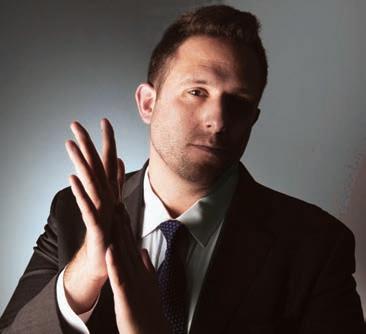
It’s similar to dating—if it’s not working, it’s probably not going to work. If they walk out the door, it’s probably not a fit. Let them walk out. You don’t want to beg for someone’s business. Why would you do that?
What was your favorite deal? We were marketing space at 875 Washington St., which is in a watch [company]–heavy area, and I went to the CEO of Breitling. I told him that he should rename the street to Watchington Street. A bunch of other watch stores were in the neighborhood, so Breitling was an obvious fit. He signed a 6,000-squarefoot lease there in February.
What’s a complicated deal you worked on recently?
I’m marketing this Meatpacking District build
ing, owned by Rockfeld, and they had CBRE as their agent. They invited us to pitch them so they could fire CBRE. When I left Cushman, they kept me on as their agent through MONA.
[Gucci] put an offer in for the space and beat the first offer from the first brand that was already negotiating. Simultaneously, we were planning to lease the second floor of the building to chocolatier Barry Cal lebaut.
[Gucci] then decided the groundfloor space was too small and wanted to take over the Kiehl’s store next door. The landlord said they could only take the space if they also took the second floor, which meant the [Gucci] bou tique would comprise the corner, the Kiehl’s and the floor above.
We were negotiating a lease with a highend brand when I got a text message through our MONA system from the CEO of another luxury brand that was interested in the space.
Note: The luxury brand that took the space is Gucci, which is public knowledge, though Singer was not at liberty to name the tenant.
We moved the chocolatier to the fifth floor. [Gucci] was looking for a small boutique, then all of a sudden it became 10,000 square feet with three spaces.
One problem with the building was the landlord rented billboard space to Hermès, which [Gucci] didn’t like, so we got the bill board too. ■
Many NYers don’t make enough to get affordable housing
BY EDDIE SMALL
The income levels that New York uses to determine afford able housing eligibility are “wildly out of sync” with the actual incomes that typical residents of the city earn, according to a report from the New York Housing Conference.

The 2022 median income for a New York family, set by the Depart ment of Housing and Urban Devel opment, is $94,500, while the medi an income for a rental household, encompassing both families and in dividuals who rent, is just $50,000, the report says. Area median income levels for New York increased by 16%
year over year and have gone up by 34% over the past four years even as wages increased by just 6% from 2017 to 2020, the report found.
The discrepancy between area median income and actual wages can have a drastic impact on rent. For someone earning the HUD fig ure, a rent comprising 30% of their income would be more than $2,300, but for someone earning the median income for the city, an affordable rent would be $1,250, the report says. There are currently about 725,000 New Yorkers earning less than $50,000 and spending more than 30% of their income on rent.
Additionally, the lowest income
level generally used in affordable housing projects is 30% of the area median income, which would be $36,030 for a family of three under the HUD standard. However, a fami ly of three with one person working a minimum wage job at $15 per hour would have an annual income of $31,200, according to the New York Housing Conference.
Recommendations
The report includes recommen dations from the United for Housing coalition urging the city to focus on building projects for New Yorkers earning less than $50,000. The city should aim to produce 8,000 deeply
affordable housing units per year, it says. The coalition also criticizes Mayor Eric Adams’ housing plan for not including specifics on what in come levels his administration will target or how many affordable hous ing units it will try to produce.
“The data clearly shows a major discrepancy between what everyday New Yorkers are experiencing finan cially and how the federal govern ment sets income standards,” said New York Housing Conference Ex ecutive Director and United for Housing organizer Rachel Fee. “At the same time, City Hall can take this opportunity to start building hous ing where the need is greatest—for
renters earning under $50,000—and establish minimum production tar gets for New Yorkers who need it most.”
Department of Housing Preserva tion and Development spokesman William Fowler defended the Adams administration’s affordable housing efforts, noting that the unit count metric had disincentivized creating deeply affordable homes and stress ing that the federal government— not the city—sets area median in come levels. He also emphasized that units for extremely low-income households now comprised a quar ter of the administration’s affordable housing production.
6 | CRAIN’S NEW YORK BUSINESS | NOvEmBER 14, 2022
Brandon Singer of MONA uses his marketing chops to land big-name clients
THE CLOSER
BUCK ENNIS SINGER
REAL ESTATE:
REAL ESTATE: THE CLOSER
“IF THEY WALK OUT THE DOOR, LET THEm WALK OUT. YOU DON’T WANT TO BEG FOR SOMEONE’S BUSINESS”
■ REAL ESTATE






FROM CONCEPTION TO COMPLETION A
leader in Real Estate Development and Construction
the Northeast
proven excellence. 914-769-6500 | @CAPPELLIORG | WWW.CAPPELLIORG.COM CAPPELLI ORGANIZATION | 7 RENAISSANCE SQUARE • 4TH FLOOR | WHITE PLAINS, NY 10601 Real Estate Investment Development Management Services Construction Management General Contracting Concrete Superstructure
prominent
in
with a 45-year track record of
president & ceo K.C. Crain group publisher Jim Kirk publisher/executive editor Frederick P. Gabriel Jr.
Voters send a message by pushing NY and the country toward the middle
We read last week’s election results as a vote for moderation.
Nationwide, voters did not do as expected and deliver a wave of opponents to the party in the White House—a typical midterm election result. In New York, the results for Congress as well as the state Legislature added a bit more red to this blue state.
seemingly ever-blue governorship. Crain’s favors moderation over extremes that disenfranchise the rest of the population, and apparently New York felt that way too.
Approximately 5.7 million New Yorkers statewide voted, according to uno cial election data, with nal absentee ballots still being counted. at is short of the 2018 turnout, when voters, driven by opposition to the Trump presidency, surged to the polls. Roughly 43% of registered voters came out this year versus 48% in 2018.
DO WE DARESAY THESE RESULTS ARE A MOVE AWAY FROM EXTREMISM?
What the nation and the state results have in common is a move to the middle. Of the six congressional races Crain’s was watching as potential toss-ups on election night, all went to Republicans. e Long Island delegation to the U.S. House will be fully Republican for the rst time in decades.
In Albany, meanwhile, Democrats held on to the governor’s o ce and were on track to keep supermajorities in both the Assembly and state Senate. ey will be narrower, however. A handful of new Republican legislators will moderate the
Do we daresay these results demonstrate a move away from extremism? Many of the election deniers—those who supported former President Donald Trump’s claim that President Joe Biden stole the 2020 election—lost their races. In that sense, Tuesday was an a rmation of our right to choose our leaders. Stability and predictability— arguably the message from voters—also are good for business. We’re a nation that has weathered too much drama in the past two years, with the pandemic

and the Jan. 6 insurrection. In places where a woman’s right to choose was on the ballot— Michigan, California, Vermont and Kentucky—voters chose in favor of abortion rights. Whatever one’s opinion on this issue, the
election results a rmed decades of practice in this country. Again, it’s a vote for stability.
For now, signs point to a welcome shift to the middle. at’s good for business in New York. ■
New York has a massive, underused resource for building decarbonization
BY GABE PHILLIPS
Policy and publicity are working in tandem to pursuade consumers to purchase electric vehicles. No question that reducing pollution from cars is important, but in New York it’s just part of the equation.
Buildings are our city’s biggest source of climate pollution. e city’s 1 million buildings generate nearly 70% of its carbon emissions because much of the energy for their heating, cooling and lighting comes from burning fossil fuels.
e passage of Local Law 97, part of the Climate Mobilization Act of 2019, proclaimed New York’s intent to reduce building’s carbon emissions 40% by 2030. Buildings in the city, however, are not onesize- ts all, and owners have been left trying to gure out what will and will not help make their buildings compliant by the approaching deadline.
e federal government is pro-
viding some help for building owners in the form of more than $100 million in new tax incentives for e ciency retro ts in the In ation Reduction Act.
Meanwhile, New York has one massive resource that is underused for building decarbonization—our roofs. e city is home to 1.6 billion square feet of rooftops and few of
tops are the key to New York getting back on track. Larger, at roofs are perfect for solar, and adding panels is cost-e ective in many commercial and industrial buildings, often achieving a payback period of less than six years.
Because of the larger size, commercial solar can achieve lower costs per watt than residential systems. But until we create a targeted incentive for the sector, we are not going to bring the real change that is needed.
should be considered at all levels of government to make commercial rooftop solar an even easiernancial choice. Complex regulations with di cult reporting and enforcement structures, such as New York’s Local Law 97, should be better supported or replaced by more practical expectations for rooftop solar adoption. Our leaders should speak forcefully about the opportunity that exists right in front of us to act against the climate crisis in an e ective, accessible way.





ISTOCK
EDITORIAL editor-in-chief Cory Schouten, cory.schouten@crainsnewyork.com managing editor Telisha Bryan assistant managing editors Anne Michaud, Amanda Glodowski director of audience and engagement Elizabeth Couch audience engagement editor Jennifer Samuels digital editor Taylor Nakagawa art director Carolyn McClain photographer Buck Ennis senior reporters Cara Eisenpress, Aaron Elstein, Eddie Small reporters Maya Kaufman, Jacqueline Neber, Natalie Sachmechi, Jasmine Sheena, Caroline Spivack op-ed editor Jan Parr, opinion@crainsnewyork.com sales assistant Ryan Call to contact the newsroom: editors@crainsnewyork.com www.crainsnewyork.com/staff 685 Third Ave., New York, NY 10017-4024
ADVERTISING
www.crainsnewyork.com/advertise sales director Laura Lubrano laura.lubrano@crainsnewyork.com senior vice president of sales Susan Jacobs account executives Kelly Maier, Marc Rebucci, Philip Redgate, Laura Warren people on the move manager Debora Stein, dstein@crain.com
CUSTOM CONTENT
associate director, custom content Sophia Juarez, sophia.juarez@crainsnewyork.com custom content coordinator Ashley Maahs, ashley.maahs@crain.com
EVENTS
www.crainsnewyork.com/events manager of conferences & events Ana Jimenez, ajimenez@crainsnewyork.com senior manager of events Michelle Cast, michelle.cast@crainsnewyork.com
REPRINTS
director, reprints & licensing Lauren Melesio, 212.210.0707, lmelesio@crain.com
PRODUCTION
production and pre-press director Simone Pryce media services manager Nicole Spell
SUBSCRIPTION CUSTOMER SERVICE www.crainsnewyork.com/subscribe customerservice@crainsnewyork.com 877.824.9379 (in the U.S. and Canada). $140.00 one year, for print subscriptions with digital access.
Entire contents ©copyright 2022 Crain Communications Inc. All rights reserved. ©CityBusiness is a registered trademark of MCP Inc., used under license agreement.

those roofs are covered with solar power. New York has made gestures and policy declarations aimed at increasing rooftop solar in the past. In 2014 the de Blasio administration set a goal of installing 1,000 megawatts of solar technology by 2030, but as of April we were only a third of the way there.
Commercial and industrial roof-
Unfortunately, commercial and industrial solar isn’t the topic of gubernatorial and presidential attention—let’s be honest, it’s not as exciting as a sports car that can reach 60 mph in 2.3 seconds. But it delivers results at a transformative magnitude and should be supported by a full slate of strategies that encourage wider use. New and enhanced incentives
ere’s no time left for missed opportunities. Let’s put our resources to work maximizing approaches that have proved to make a serious impact in the ght against climate change. New York’s commercial real estate has a lot to o er the climate ght— millions of square feet of solar-ready rooftops. ■
Phillips is founder and CEO of Catalyst Power.
chairman Keith E. Crain vice chairman Mary Kay Crain president & ceo K.C. Crain senior executive vice president Chris Crain editor-in-chief emeritus Rance Crain chief nancial of cer Robert Recchia founder G.D. Crain Jr. [1885-1973] chairman Mrs. G.D. Crain Jr. [1911-1996]
8 | CRAIN’S NEW YORK BUSINESS | NOVEMBER 14, 2022
EDITORIAL
Gabe
OP-ED
REDUCING POLLUTION FROM CARS IS JUST PART
THE EQUATION
OF
New York’s effort to boost sustainable energy must also prioritize family-sustaining careers
 BY GARY LABARBERA
BY GARY LABARBERA
As the economy continues to fight off inflation and possi ble recession, it is critical to think about how to best meet New York’s ambitious goals in a way that maximizes both economic devel opment benefits to the state and cost savings to residents.
That’s one of the many reasons the state Building and Construction Trades Council partnered with the state AFL-CIO, the Independent
sent a significant number of New York’s workers and businesses, all of which make up a large portion of the state’s economy.





The state can do more
The goals laid out by our infor mal coalition include promoting safe, reliable and diverse energy in frastructure, communicating cost impacts and reducing emissions from all sectors. Perhaps most im portant for New York’s middle class, we believe in the importance of la bor standards for these new jobs in energy generation and transmission.


WE BELIEVE IN LAbor STANDArDS FOR THESE NEW JOBS IN ENERGY GENERATION




Power Producers of New York and the Business Council of New York State to lay out a vision for advanc ing the state’s clean-energy goals.











While these four groups don’t al ways see eye to eye, in this instance we are aligned, as the consequenc es of implementing this transition in an unreasonable way would be damaging to both labor and busi ness alike. Collectively, we repre
The inclusion of prevailing wage, project labor agree ments, labor peace agreements and Buy American pro visions would ensure unions are part of the solution in implement ing the Climate Leadership and Community Protection Act. Pre vailing wage is already a condition of contracts with the New York State Energy Research and Development Authority under the Clean Energy Standard. New laws we advocated last year require these labor stan
dards on renewable energy genera tion projects, but there is room for the state to do more.

For many, prevailing wage stan dards have been the pathway to the middle class, uplifting thousands of New Yorkers out of poverty.
In addition, job training and workforce development programs will help ensure that those building these nation-leading projects and driving forward these initiatives are not only best-in-class but are also minority and underserved New Yorkers looking to build their own family-sustaining careers. Invest ment in clean energy and green in frastructure is an important oppor tunity to not only develop a highly skilled workforce, but also to pro vide hardworking New Yorkers a path to the middle class via longterm union job opportunities.
The Building and Construction Trades Council has been proud to take on a leading role in helping our state emerge as a leader in clean energy, from training the future of our workforce for the sustainable economy to breaking ground on the state’s first offshore wind project. Creating and retaining high-quality union labor jobs through the CLC

PA should be the cornerstone of the next phase of meeting our goals.
Lay the groundwork
But goals mean little if there is a lack of practical plans to achieve them. New York has made signifi cant progress toward meeting am bitious climate and clean energy benchmarks, but to maintain that momentum, further groundwork for job creation and union career


longevity must be made immedi ately. The practical implementation of the CLCPA is critical to New York’s working class and to our state’s clean energy economy for the future. ■
Gary LaBarbera is president of the Building and Construction Trades Council of Greater New York, which represents unionized construction workers.
Oxford insurance products are underwritten by Oxford Health Insurance, Inc. Oxford $0 deductible plans are available for New York-sitused employers and can be paired with either the Freedom, Liberty or Metro network. $0 virtual care copays apply to all Oxford fully-insured non-HSA plans except for Healthy NY. Plans sold in New York use policy form numbers: OHINY_SG_GEA_2023 and POL20.OHI.2019.LG.NY. 24/7 Virtual Visits is a service available with a provider via video, or audio-only where permitted under state law. It is not an insurance product or a health plan. Unless otherwise required, benefits are available only when services are delivered through a Designated Virtual Network Provider. 24/7 Virtual Visits are not intended to address emergency or life-threatening medical conditions and should not be used in those circumstances. Services may not be available at all times, or in all locations, or for all members. Check your benefit plan to determine if these services are available.
Advocate4Me® services should not be used for emergency or urgent care needs. In an emergency, call 911 or go to the nearest emergency room. The information provided through Advocate services is for informational purposes only and provided as part of your health plan. Wellness nurses, coaches and other representatives cannot diagnose problems or recommend treatment and are not a substitute for your doctor’s care. Your health information is kept confidential in accordance with the law. Advocate services are not an insurance program and may be discontinued at any time.
November 14, 2022 | CrAIN’S NeW YorK bUSINeSS | 9
OP-ED
B2B EI221614069.0-OXF 8/22 © 2022 Oxford Health Plans LLC All Rights Reserved.
22-1546044-E
$0 Deductible
Virtual
You’ll get that. Plus, enhanced 1-to-1 support for your employees — thanks to our health advocates. These are just some of the ways an Oxford health plan may help your employees and your business’s bottom line get healthier. Contact your broker or visit uhc.com/oxfordnow Get started ISTOCK
plan options
Visit copays
Tom Grech is building on the entrepreneurial spirit Amazon once saw in Queens
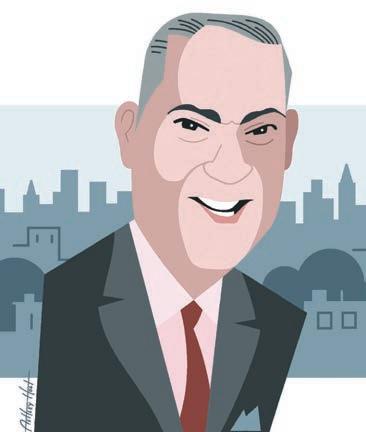 INTERVIEW BY BRIAN PASCUS
INTERVIEW BY BRIAN PASCUS
it left, and what makes a truly successful team.
How did you get to your position of power?
Immediately before my appointment to the Queens chamber, I was in the energy field. I was part of a small company that was run by a man named Bob Catell, former president of Brooklyn Union Gas. His vision of growing the business included joining a chamber of commerce.
I had spent most of my career working for Fortune 500 companies: RR Donnelly & Sons, a large international printing company, and I also ran supply chain for the Sony Corporation. I had a lot of classically trained Fortune 500 experience, and the energy firm was an opportunity to be with a smaller business that was rapidly scaling. We joined the Queens chamber, and I got to be involved, and we grew our business because of the Queens chamber.
Takeaway for business professionals
Queens, home to roughly 2.4 million people, would be the fifth-largest city in America on its own. It is New York’s most diverse borough, with more than 190 spoken languages. The borough has 40,000 businesses and includes the city’s two airports, Flushing Meadows Park, a professional baseball team, and several colleges and universities, notably St. John’s University and York College.
What was Queens’ business landscape like when you arrived seven years ago?
Queens has always been the underdog, kind of like the New York Mets and the Little Engine That Could. Up until the last half-dozen years, Queens was the place you traveled through. In the past number of years, Queens became the place you traveled to. You traveled to us for our restaurants, our shopping, our small businesses, all of which are revolving around our great, great diversity.
What has made your tenure successful?
It’s because of my life experience and work experience with those two companies: I opened offices internationally for RR Donnelly and worked for Sony Corporation. I was exposed to lots of people from all walks of life, so coming into the chamber, while I didn’t have experience in that field, I was a natural. I was able to leverage the spirit of cooperation and working with groups to lift up the chamber and make us the go-to source for anything to do with business in Queens County.
More importantly, I’ve made it my core mission to better reflect the people and business of Queens County at the Queens chamber. Today I have three key measures: We have the most diverse board of directors that we’ve ever had, maybe within the City of New York; we have the most diverse number of members we’ve ever had, who better reflect that diversity; and we’ve grown
the staff to just over 30 people. We also speak 19 languages.
Why do you think Amazon initially chose Queens as its HQ2 location?
After they chose Queens and we were able to get together to socialize and figure out the next steps, I asked a frank question: Why did you choose us?
Number one was our diversity, as Amazon was trying to grow its presence on a global scale. Where better to do it than the most diverse place on earth? Number two, they chose us for our transportation network. They saw the writing on the wall with our commitment to rebuild LaGuardia, and there was talk then of JFK [International Airport] being next, and that’s coming to pass now. They saw our transportation network as essential to attract the best and brightest. Number three was our education platform.
Queens County has seven colleges and universities with well over 100,000 students, and of those students, 48% are foreign born.
Who is to blame for HQ2 failing?
I think it was more of a mindset in the failing. When I look back on after they pulled out, three or so years ago, if a place like southeast Queens had been chosen, like downtown Jamaica, also a transportation hub, then I think the local folks and elected officials would have embraced it. Especially as we exit this post-Covid period— where they promised 25,000 jobs and $150,000 per job—I think the whole mindset would’ve been different and southeast Queens would’ve embraced it.
What’s your five-year plan for the borough?
My five-year plan for Queens is to continue to grow the diversity of the chamber, and really get involved and set the pace for the development at Willets Point, Sunnyside Yards, and totally embrace the development going on at JFK airport. It’s essential we build a rail connection from LaGuardia to Willets Point. That rail line will open up Flushing
DOSSIER
NUMBER OF EMPLOYEES 30 (speaking 19 languages)
ON HIS RÉSUMÉ Vice president, RR Don nelly & Sons (1985–1996); vice presi dent, Merrill Corp. (1996–2000); senior vice president, Xlibris (2000–2001); senior vice president and sales direc tor, Virtudocs (2002–2009); operations executive, Sony DADC (2009–2011); managing director, JTT Energy (2010–2013); director of sales, CCI Energy Solutions (2014–2015); executive di rector, Queens Chamber of Commerce (2015–2017); president and chief executive officer, Queens Chamber of Commerce (2017–present)
BORN Astoria
RESIDES Malverne, Long Island
EDUCATION Bachelor’s in accounting, University of Scranton; MBA in interna tional business, Manhattan College
BREAKING THE MOLD After Amazon de cided not to build a second headquar ters in Long Island City in 2019, Grech launched the Queens Tech Council. The council intends to grow the number of technology firms and ensure Queens remains a place to incubate job growth in the technology sector. “Maybe we won’t get an HQ2,” Grech said, “but we want to make sure young people in high school and college can get access to great tech jobs and not leave.”
Why do you think capable people lose power?
I think sometimes it goes to their head. I also think they don’t do enough to build a bench around their team. I am forever looking to make sure I have the right people at the right jobs at the right time. You’ll have a natural tendency toward turnover, but I want to empower people to make sure they, number one, have fun in what they do, especially if they’re going to spend 10 hours a day coming to and from work. Number two is getting it done, exceeding the need, overachieving.
What do you do for fun?
I love being with my family. I love traveling with them. I’m a huge Mets fan and having a guy like Steve Cohen in our backyard and those wonderful New York Mets make it so much better. ■
10 | CRAIN’S NEW YORK BUSINESS | NOvEmBER 14, 2022
Meadows Corona Park, Citi Field and Flushing to everybody from Manhattan and from the east. Having that rail connection is essential.
POWER CORNER
ASHLEY HOLT
Tom Grech knows the Queens business community inside and out. As the president and CEO of the Queens Chamber of Commerce, Grech oversees an ecosystem of 40,000 businesses of all shapes and sizes—from microfirms with fewer than five employees to JetBlue Airways’ head quarters in Long Island City. The Queens chamber has 1,400 members, who collectively represent 150,000 employees. Grech spoke with Crain’s about his long career as an executive, why Amazon first fell in love with Queens, why
11/11
Honoring those who serve 24/7
With over 200,000 veterans and service men and women reentering the workforce each year, Bank of America is supporting the unique needs of our heroes as they transition to civilian life and careers.
Some steps we’re taking to support veterans and military members:

• Offering free online resources through BetterMoneyHabits.com on topics specific to them, from home buying to retirement

• Expanding the number of financial centers near military installations to address the needs of military customers
• Continuing our hiring momentum — more than 15% of our new hires are military veterans
My teammates and I here in New York City are proud to support our military service men and women, especially as we celebrate Veterans Day. Thank you for your service.
®
Learn more at bankofamerica.com/metroNYC
Bank of America, Better Money Habits, Mejores Hábitos Financieros and the Bank of America logo are registered trademarks of Bank of America Corporation. Bank of America, N.A. Member FDIC. Equal Credit Opportunity Lender © 2022 Bank of America Corporation. All rights reserved.
What would you like the power to do?
José Tavarez President, Bank of America New York City
JESSICA KATZ New York City
INTERVIEW BY EDDIE SMALL
Jessica Katz has taken charge of affordable housing in New York at a time when the issue seems to be at the root of many major problems facing the city, ranging from an over burdened shelter system to record high rents. As the chief housing officer in Mayor Eric Adams’ administration, Katz plays a key role in the effort to address New York’s longstanding shortage of affordable homes and hopes to make it easier for developers to navigate zoning rules.
Has New York built enough housing in recent years?
A lack of housing supply is at the root of our affordability crisis. This is a crisis that’s been generations in the making. As our economy grows, we have not built nearly enough housing to keep pace. Other cities have been able to amend the zoning code to make it easier to build, and a consensus for those kinds of reforms is building here in New York. You’ve seen some momentum around the idea that building more housing is really critical given the need.
What are the main steps the Adams administration is doing to boost housing production?

We are working toward some zoning changes that will streamline production and remove some of those regulatory barriers that make it harder and more expensive to build in New York. Last year we were able to get funding for a hotel conversion program to create more flexibility in that market. We weren’t able to get a basement apartment or an accessory dwelling unit bill

WHO SHE IS New York City’s chief housing officer
AGE 45
BORN Moscow GREW UP Cambridge, Massachusetts


RESIDES Prospect Heights
EDUCATION Bachelor’s in urban geography, McGill; master’s in city planning, MIT
FAMILY Katz is married with two young children, ages 4 and 7.
HPD VET Katz started working at the Department of Housing Preservation and Development in 2003 and has had a front-row seat to many of the city’s housing issues over the past 20 years. There have been ups and downs, and one problem that she believes is peaking now is the poor quality of New York’s public housing. “It’s been deteriorating markedly over time,” she said, “and it will continue to do so until we see a big influx of capital.”
passed last session in Albany, but we will go back up again next spring to try again. We want to make sure if a homeowner wants to have an apartment above their garage or legalize their basement unit, they’re able to do that.
Is the zoning code a good target for housing reform? The zoning code and some of our processes need to change in order to create more housing. There will be some changes proposed to the land-use review process, in particular all of the processes that lead up to the land-use review process. There will be some proposed changes made to the threshold at which we require an environmental review. If it’s a smaller project, we’re not going to subject it to quite as much scrutiny. We want to see other changes to our regulatory processes besides zoning, and we’ll send out that report shortly.
The mayor’s housing plan has been criticized for not including specific targets for affordable housing production. Why didn’t the administration include those?
We are absolutely laying out a specific goal. What we didn’t do was focus on taking our curtain call the moment that work on the units starts. We’re taking our curtain call at the moment that someone moves into housing, which is something that’s never been tracked before. That is the number we want to keep our eye on. We are still developing the data system that would allow us to track that, and as soon as we do, we will have targets. The amount of time these units sit vacant while we wait for paperwork is something we’re laser-focused on.
City Hall has come out in favor of neighborhood hous ing developments despite opposition from the local council member. Will this be a regular occurrence?
There’s not an initiative in this town that doesn’t have some local opposition, but what we’ve seen recently is that there’s also a tremendous amount of support for building new housing. It’s been a great partnership, most times, with the City Council to make sure we’re addressing local needs but also citywide housing needs. ■
12 | CRAIN’S NEW YORK BUSINESS | NOvEmBER 14, 2022
ASKED & ANSWERED
Join us to hear from Andrew Kimball, President & CEO of the New York City Economic Development Corp., interviewed live on stage by Crain’s New York Business Editor-in-Chief Cory Schouten. Find out how the agency plans to drive the next round of corporate investment in New York, which industries it is prioritizing, where the city economy is heading, and how the EDC envisions the future for public-private partnerships. Wednesday, Nov. 16 | 8-9:30 AM BREAK FA ST CRAIN’S NEW YORK BUSINESS FA ST RK BUSINESS Register Now! CrainsNewYork.com/PB_Kimball
BUCK ENNIS
Economic Development Corporation Register Here Be where news happens Sponsored By
Andrew Kimball President & CEO
New York City
LAW
Latham & Watkins
Andrew Blumenthal has been elected a partner at Latham & Watkins LLP in New York, effective January 1. A member of the Capital Markets Practice and Corporate Department, he advises corporate, private equity, and banking clients on capital markets, securities, and corporate governance matters.
LAW
Latham & Watkins
Eric Rice has been elected a partner at Latham & Watkins LLP in New York, effective January 1. A member of the Capital Markets Practice and Corporate Department, he advises clients on equity derivatives and equity-linked products, including convertible notes, structured share repurchases, hedging and monetization transactions, and margin loans.

LAW
Latham & Watkins
Samir Deger-Sen has been elected a partner at Latham & Watkins LLP in New York, effective January 1. A member of the Supreme Court & Appellate Practice and Litigation & Trial Department and former US Supreme Court clerk, he focuses on appellate litigation and is an experienced oral advocate, having argued more than a dozen cases in the federal and state courts.
LAW
Latham & Watkins
Mark Semotiuk has been elected a partner at Latham & Watkins LLP in New York, effective January 1. A member of the Real Estate Practice and Corporate Department, he represents private equity funds and REITs in real estate transactions, including M&A, joint ventures, nancings and other corporate matters.
LAW
Latham & Watkins
Michelle Ernst has been elected a partner at Latham & Watkins LLP in New York, effective January 1. A member of the Intellectual Property Litigation Practice and Litigation & Trial Department, she focuses on patent litigation and strategic counseling in the pharmaceutical, life sciences, and biotechnology industries.
LAW Latham & Watkins
David Siegel has been elected a partner at Latham & Watkins LLP in New York, effective January 1. A member of the Structured Finance Practice and Finance Department, he represents banks and other nancial institutions, issuers, borrowers, and sponsors in a variety of securitizations and other structured asset-based nancing transactions.
LAW Latham & Watkins
Oliver PrakashJenkins has been elected a partner at Latham & Watkins LLP in New York, effective January 1. A member of the Investment Funds Practice and Corporate Department, he advises private capital sponsors on the formation and operation of their funds across a variety of strategies, including buyout, growth equity, energy, infrastructure, real estate and credit, and also represents clients on structured secondaries transactions.


LAW
Latham & Watkins
John Slater has been elected a partner at Latham & Watkins LLP in New York, effective January 1. A member of the Capital Market Practice and Corporate Department. He represents issuers, underwriters, and selling security holders in public and private offerings of securities and also advises clients on securities compliance and corporate governance matters.
LAW
Latham & Watkins



Matthew Villar has been elected a partner at Latham & Watkins LLP in New York, effective January 1. A member of the Mergers & Acquisitions Practice and Corporate Department, he advises on public and private acquisitions, dispositions, co-investments, joint ventures, and general corporate matters, primarily representing private equity rms.





LAW
Latham & Watkins




Naim Culhaci has been promoted to counsel at Latham & Watkins LLP in New York, effective January 1. A member of the Capital Markets Practice and Corporate Department, he advises investment banks, hedge funds, private equity rms, alternative trading platforms, transfer agents, other securities-related platforms, and ntech startups on brokerdealer, investment adviser, and securities market regulation matters.












LAW



Latham & Watkins

Alyssa Galinsky has been promoted to counsel at Latham & Watkins LLP in New York, effective January 1. A member of the Mergers & Acquisitions Practice and Corporate Department, she advises private equity funds and private and public companies on M&A and dispositions, joint ventures, co-investments, carve-outs, reorganizations, and general corporate matters.
LAW
Latham & Watkins
Jonathan Goldberg has been promoted to counsel at Latham & Watkins LLP in New York, effective January 1. A member of the Banking Practice and Finance Department, he represents lead arrangers, direct lenders, and other nancial institutions in leveraged nance transactions.
LAW Latham & Watkins
Sonja Pollack has been promoted to counsel at Latham & Watkins LLP in New York, effective January 1. A member of the Banking Practice and Finance Department, she represents private equity rms and their portfolio companies, nancial institutions, and debt investors in leveraged nance transactions, including acquisition nancings, cash- ow and assetbased credit facilities, and junior lien and mezzanine nancings.

LAW
Latham & Watkins
Max Raskin has been elected a partner at Latham & Watkins LLP in New York, effective January 1. A member of the Executive Compensation, Employment & Bene ts Practice and Tax Department, he advises private equity sponsors and private and public companies on equity structuring and the bene ts and compensation aspects of M&A and other corporate transactions.
LAW
Latham & Watkins
Salvatore Vanchieri has been elected a partner at Latham & Watkins LLP in New York, effective January 1. A member of the Capital Markets Practice and Corporate Department, he represents nancial institutions, private equity rms, and issuers in complex corporate nance and capital markets transactions.
LAW
Latham
& Watkins
Benjamin Lee has been promoted to counsel at Latham & Watkins LLP in New York, effective January 1. Amember of the Mergers & Acquisitions Practice and Corporate Department, he advises corporations and nancial institutions on insurance regulatory issues, particularly the use of non-payment insurance for regulatory capital relief purposes, and also advises banks and asset managers regarding the potential for risk transfer transactions to be regulated as insurance.
LAW
Latham & Watkins
Gemma Mootoo Rajah has been promoted to counsel at Latham & Watkins LLP in New York, effective January 1. A member of the Capital Markets Practice and Corporate Department, she represents nancial institutions, corporate clients, and private equity rms in capital markets transactions and general securities matters.
NOVEMBER 14, 2022 | CRAIN’S NEW YORK BUSINESS | 13
To place your listing, visit www.crainsnewyork.com/people-on-the-move or, for more information, contact Debora Stein at 917.226.5470 / dstein@crain.com Advertising Section
PEOPLE ON THE MOVE
INDUSTRY ACHIEVERS ADVANCING THEIR CAREERS Recognize them in Crain’s For listing opportunities, contact Debora Stein at dstein@crain.com or submit directly to CRAINSNEWYORK.COM/PEOPLEMOVES
LARGEST NONPROFITS
New York–area organizations ranked by total expenses
ORGANIZATION
United States Fund for UNICEF 1 125 Maiden Lane New York, NY10038
International Rescue CommitteeInc. 122 E. 42nd St. New York, NY10168
Doctors Without Borders USAInc. 40 Rector St. New York, NY10006
Jewish Communal Fund 575 Madison Ave. New York, NY10022
New York Blood Center 310 E. 67th St. New York, NY10065
6
7
The Metropolitan Museum ofArt 1000 Fifth Ave. New York, NY10028
Leukemia & Lymphoma Society 3 International Drive Rye Brook, NY10573
PHONE/ WEBSITE TOP EXECUTIVE 2021/ 2020 TOTAL EXPENSES
212-686-5522 unicefusa.org
MichaelNyenhuis President, chief executive
212-551-3000 rescue.org
DavidMiliband President, chief executive
212-679-6800 doctorswithoutborders.org AvrilBenoit Executive director
212-752-8277 jcfny.org
212-570-3100 nybloodcenter.org
212-535-7710 metmuseum.org
914-949-5213 lls.org
DanielWeiss President, chief executive
% EXPENSES ALLOCATED TO PROGRAMMING 2021
AMANDA.GLODOWSKI@CRAINSNEWYORK.COM
% EXPENSES ALLOCATED TO FUNDRAISING 2021 2021 TOTAL ANNUAL INCOME
% 2021 REVENUE FROM PRIVATE CONTRIBUTIONS
$1.01B 2 $540.11M 90% 8% $1.1B 101% 3
$979.51M 4 $825.57M 84% 6% $979.5M 4 n/d
$599.98M $499.59M 85% 13% $649.4M 96%
$538.39M 5 $548.77M 5 97% 0% $678.6M 5 n/d
LouisDeGennaro President, chief executive
8
Catholic Medical Mission BoardInc. 100 Wall St. New York, NY10005 9
American Jewish Joint Distribution CommitteeInc. 220 E. 42nd St. New York, NY10017 10
Teach for AmericaInc. 25 Broadway New York, NY10004
12
UJA-Federation of New York 130 E. 59th St. New York, NY10022
SCO Family of Services 1415 Kellum Place Garden City, NY11530
Services for the UnderServed 7 463 Seventh Ave. New York, NY10018
212-687-6200 jdc.org ArielZwang Chief executive $336.74M $370.97M 90% 3% $398.3M 72%
212-577-3300 legalaidnyc.org JanetSabel Attorney-in-chief, chief executive $334.1M 6 92% 0% $328.1M 6 -25%
ElisaVillaneuva Beard Chief executive
212-980-1000 ujafedny.org EricGoldstein Chief executive
516-671-1253 sco.org
212-633-6900 sus.org
$258.62M 73% 10% $252.4M 71%
$253.95M $244.12M 78% 12% $334M 67%
KeithLittle President, chief executive $252.73M $267.33M 89% 0% $255.2M 6%
JorgePetit, MD President, chief executive $248.47M 83% 0% $256.4M 2%
ToTo qualifyqualifyforfor thisthis listlist organizationsmust be tax-exempt 501(c)(3) nonprofits with headquarters in the NewYork area. This includes NewYorkCity andNassau,SuffolkandWestchester countiesinNew York,and Bergen, Essex, Hudson and Union countiesinNewJersey. Crain'sNew YorkBusiness uses staffresearch,extensive surveys andthemostcurrentreferencesavailableto produce itslists, but there is noguaranteethatthelistingsarecomplete.Universities,colleges, libraries,hospitals,healthcareinstitutions, medical practice groups andresearchinstitutionsare excluded. Information is fromthe foundations,foundation websites, Forms 990 andfinancialstatements.n/d-Not disclosed. Send feedback to researcher@crainsnewyork.com.
Contains figures fromtwoaffiliated 990s. 2 Expenseincreasereflectsincreasedprogrammingactivityenabled by fundraising growth.
period ending June 2021. 7 Includes data from 990s for two
for
period ending Sept. 2021. 5 Figure from organization's 990. 6 Figure from organization's audit
14 | CRAIN’S NEW YORK BUSINESS | NOvEmBER 14, 2022 THE LIST
1
2
3
4
SusanDickman Executive vice president, chief executive 5
ChristopherHillyer President, chief executive $507.09M 5 $482.83M 5 91% 0% $554.7M 5 4%
$368.98M 5 $421.21M 57% 4% $536.5M 5 35%
$359.85M $394M 71% 15% $477.7M 92%
212-242-7757 cmmb.org Mary BethPowers President, chief executive $356.69M 4 $466.68M 4 97% 2% $416.4M 4 10%
The Legal Aid Society 199 Water St. New York, NY10038 11
212-279-2080 teachforamerica.org
13
14
15
audit for
Institute of International Education 1 World Trade Center New York, NY10007 affiliated organizations.
212-883-8200 iie.org AllanGoodman Chief executive $244.6M $275.46M 88%
0% $281.4M 12%
1
3 Netrevenue wasimpacted by assetfluctuations. 4 Figure from organization's
LARGEST FOUNDATIONS
New York–area charities ranked by total assets



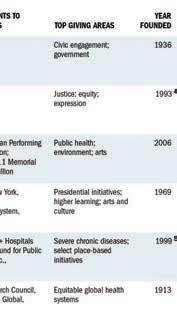
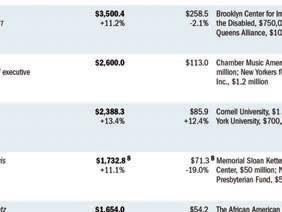

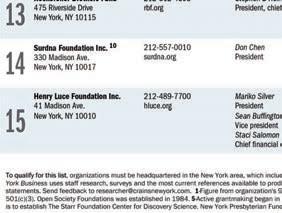
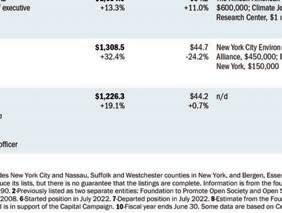
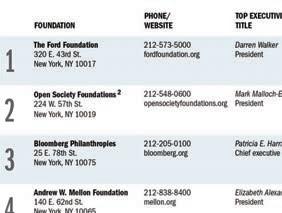

AMANDA.GLODOWSKI@CRAINSNEWYORK.COM

NOVEMBER 14, 2022 | CRAIN’S NEW YORK BUSINESS | 15
THE LIST
GOP sweeps Democrats in key toss-up congressional races
BY JASMINE SHEENA AND SHELBY ROSENBERG
Ared wave may not have materialized across the country or in New York’s governor’s race, but it ap pears to have washed over the state’s congressional delegation.
Republicans are celebrating big pickups in New York that are helping tilt the majority in the U.S. House of Representatives in their direction. The gains were driven in part by re districting chaos that delivered an unprecedented number of toss-up districts in a midterm year.
As a note, Crain’s is using the un official tallies from the state Board of Elections in this article because not all absentee ballots have been counted yet.
AMONG THE KEY RACES:
GOP flips NY-3, ending eight-year
Democratic streak
Republican George DevolderSantos defeated Democrat Robert Zimmerman in a race that election forecaster Cook Political Report la beled a toss-up, with a slight lean in Zimmerman’s favor. Devolder-San tos took the seat, garnering 52.5% of the unofficial vote, compared to 44.4% by Zimmerman, according to the state Board of Elections.
The race marked the first time that two openly gay candidates compet ed against each other for a congres sional seat.

Zimmerman, a 68-year-old mar keting executive and a Democratic National Committee member, and Devolder-Santos, a 34-year-old in vestor who unsuccessfully ran for Congress in 2020, vied to represent District 3, which covers the north ern part of Nassau County and northeastern Queens. Democrat Tom Suozzi, who had held the seat
since 2017, left it in a failed bid for governor.
As the central theme of his cam paign, Devolder-Santos champi oned a commitment to tackling crime, inflation and the cost of ener gy, including advocating for more funding to enhance the electric grid.
Zimmerman took a different tac tic on affordability issues, advocat ing for measures to reduce prescrip tion drug prices and for bringing back the full federal deduction for state and local taxes. He criticized his opponent for a restrictive stance on abortion rights, his support of a Florida law critics have dubbed “Don’t Say Gay” and his alleged presence at a Jan. 6 rally after which protesters stormed the Capitol.
NY-4 goes red for the first time in 26 years
Republican Anthony D’Esposito toppled Democrat Laura Gillen in the battle for the 4th District seat in the U.S. House of Representatives. D’Esposito pulled in 50.6% of the unofficial vote, according to Board of Election numbers, beating Gillen by less than four points.

The district, which covers much of Nassau County’s South Shore, had been held by Democrats since 1996, but when incumbent Kathleen Rice declined to run for re-election this year, it left the Democrats’ legacy there in question. It had been con sidered marginally safe for the Dem ocrats after new lines were drawn during redistricting in the summer but not a given in light of Republican wins in last year’s municipal elec tions on Long Island.
D’Esposito, a Hempstead town councilman and a retired New York City police detective, took up the Re publican mantle of crime and the cost of living, and lambasted Gillen for not doing enough to bring down taxes. Gillen, a former Hempstead
supervisor who served from 2017 to 2019, tapped into Democratic themes of abortion rights, voter in tegrity and gun safety.
Malliotakis cruises to easy victory in NY-11
Republican incumbent Nicole Malliotakis defeated Democratic challenger and former District 11 Rep. Max Rose in the race to repre sent Staten Island and parts of Brooklyn.
Despite a modest liberal popula tion in the north of Staten Island, as well as in parts of Bay Ridge, Ben sonhurst and Dyker Heights, Rose ultimately failed to gain enough traction in the district, bringing in 37.3% of the unofficial vote com pared to Malliotakis’ 61%, according to the state Board of Elections.
Malliotakis’ victory concluded the second rematch between the two. In 2018 Rose, an Army veteran who served in Afghanistan, defeated Re publican incumbent Dan Donovan to snag a House seat, but he lost it in 2020 to Malliotakis.
Rose encountered an uphill battle to gain favor on Staten Island, a con servative bastion with a strong inde
ponent, Rose had little support from the national arm of his party, from which he’s distanced himself over the years as he’s taken a more moderate stance on a range of is sues.
Republican Lawler upsets Democrat Maloney in NY-17
Democrat Sean Patrick Maloney conceded the 17th Congressional District seat, in the Hudson Valley, to Republican challenger Mike Law ler in a tight race in a district that had been represented by Democrat Mondaire Jones.
Lawler won a razor-thin race with 49.4% of votes to Maloney’s 48.5%, according to unofficial results.
Lawler is a small-business owner and represents Assembly District 7. He is a former exec utive director of the state’s Republican Party.
A Democratic super PAC, in turn, began targeting Lawler.
GOP wins tight NY-19 race
Republican Marc Molinaro de feated Democrat Josh Riley in the 19th District in a race that was wide ly seen as a toss-up. The Associated Press called the race in Molinaro’s favor Wednesday. The district in cludes parts of Tompkins, Broome, Delaware and Greene counties. Mo linaro garnered 50.3% of the vote, compared to Riley’s 48%, according to the unofficial tally.
Molinaro is the Dutchess County executive. He mounted a run for the 19th Congressional District in the past, as well as one for governor of New York against Andrew Cuomo.
Republican declares victory in NY-22
Exactly 12 months ago, I warned “the crypto frenzy is bubbling over” and “it’s time to pocket your winnings and get out.” I am now here to say the crash has miles to go before it sleeps because, as Robert Frost kind of said, the woods are dark and deep and crypto-touts have promises they cannot keep.
Last week’s failure of FTX, the No. 2 digital-asset exchange, is at least the fourth to collapse just this year and raises an important question: Why do fans keep thinking crypto is going to turn out OK?
FTX vaporized almost instantly when customers decided parking
deposits there was too risky and yanked out $6 billion, which was more than the firm could han dle. It was a digital version of the bank run in It’s a Wonderful Life, the differ ences being Sam Bank man-Fried couldn’t stem the tide like Jimmy Stewart did, and this time Mr. Pot ter (Binance) pulled out of the rescue deal.
FTX customers have no protec tion against loss because crypto’s credo holds that government guard rails, such as deposit insurance, are unnecessary. FTX investors, which
pendent streak. Malliotakis, backed by an endorsement from former President Donald Trump, followed other Republican candidates by em phasizing crime rates and the econ omy in her campaign.
Rose tapped into Democratic messaging surrounding abortion and voter rights while maintaining that he would prioritize his constit uents over politics. Unlike his op
It was a particu larly embarrassing loss for Democrats, as Maloney headed up the Democratic Congressional Campaign Committee, which is re sponsible for fundraising and strate gizing to protect Democrats’ majori ty in the House.
Super PAC spending was fierce in this race. Kevin McCarthy, the House of Representatives’ minority leader, authorized his political ac tion committee to dump $4 million into the race in one week in October.
Republican Brandon Williams de clared victory early Wednesday in the 22nd Congressional District against Democrat Francis Conole to succeed Republican Rep. John Kat ko in representing Oneida, Madison and Onondaga counties.
Williams was in the lead with 49.73% of the vote on Friday, with Conole holding 48.26%, according to the unofficial vote. The race had not been called by AP at press time.
Williams defeated candidate Ste ven Wells in the primary. Before his foray into politics, Williams served in the Navy and founded a software company that provides tools to in dustrial manufacturers. ■
include Sequoia Capital and Tom Brady, are bound to recover less from this di saster than Bernie Mad off’s victims. Should the firm end up in bankruptcy, account holders will be unsecured creditors, which confers the right to go on Twitter and yell.
The weirdest thing about this particular ma nia is that crypto doesn’t work. The wildly unstable curren cies are terrible stores of value and fail as a means of exchange. Crypto is playtime for ringleaders who per suaded enough people that certain
blocks of code are money.
Bitcoin is still worth about $17,000 after last week’s drama, or about $50,000 less than a year ago. I doubt institutional investors will be inter ested again in the space for years, if ever, unless regulators impose some rules. That would really be some thing, because the point of crypto is a separate financial ecosystem free of government interference.
For those who stayed out of the
game, the question is whether FTX’s implosion puts the broader financial system at risk. It appears big banks didn’t contaminate their balance sheets with crypto, but we don’t re ally know their exposure to FTX or its counterparties. Back in 2017, crypto skeptic Jamie Dimon said he’d fire a JPMorgan trader “in a sec ond” for dealing in bitcoin.
Let us pray the lords of the finan cial realm stuck to their guns. ■
November 14, 2022—Crain’s New York Business (ISSN 8756-789X) is published weekly, except for no issue on 1/3/22, 7/4/22, 7/18/22, 8/1/22, 8/15/22, 8/29/22 and the last issue in December. Crain Communications Inc., 685 Third Ave., New York, NY 10017. Periodicals postage paid at New York, NY, and additional mailing offices. Postmaster: Send address changes to: Crain’s New York Business, Circulation Department, 1155 Gratiot Ave., Detroit, MI 48207. For subscriber service: call 877-824-9379; fax 313-446-6777. $140.00 per year. (GST No. 13676-0444-RT) ©Entire contents copyright 2022 by Crain Communications Inc. All rights reserved.
16 | CRAIN’S NEW YORK BUSINESS | NOvEmBER 14, 2022
Vol. 38, No. 40,
POLITICS
AP
REPUBLICANS’ GAINS WERE DRIVEN IN PART BY REDISTRICTING CHAOS
CORRECTIONS ■ Updated 40 Under 40 honoree profiles for Faiza Ali, Katherine Fogertey, Lindsay Kaplan, Jonathan Kyriacou, Katrell Lewis, Matt Melymuka and John Quinn can be found at CrainsNewYork.com. FTX’s fast demise shows crypto’s crash has miles to go
LAWLER greets a supporter at his election night party on Nov. 8.
IN THE MARKETS
AARON ELSTEIN
With a return to pre-pandemic activities, nonpro ts are opening their doors to volunteers, hosting in-person events and growing like never before. In our 2022 Giving Guide, Crain’s New York Business is proud to partner with Rise and Share’s #BetterTogether year-end community giving program. e guide showcases a group of noteworthy nonpro ts serving the New York Metropolitan area found on JustGiveNY.org and JustGiveNJ.org. We hope you are inspired to spread generosity and help nonpro ts ful ll their needs during this giving season, start a new nonpro t relationship, or enhance existing ones.






S2 FEATURE: As Life Returns to ‘Normal’ in New York, Charitable Donors Open Their Wallets S3 Wishlist S4,S5 Community Service Society of New York S6,S7 RiverSpring Living S8 Avenues for Justice S9 Brooklyn Community Foundation S10 Children’s Aid S11 The Floating Hospital S12 HELP USA INSIDE is guide to nonpro t giving was sponsored by the featured nonpro ts and produced by Crain’s Content Studio. For more information about this report, contact
Juarez, Associate Director, Crain’s Content Studio in New York.
Sophia
SPONSORED CONTENT FOR CRAIN'S NEW YORK BUSINESS | S1
GIVING GUIDE GIVING GUIDE 2022
As Life Returns to ‘Normal’ in New York, Charitable Donors Open Their Wallets
By Elaine Pofeldt for Crain’s Content Studio
Yuriy Boyechko is on a mission. He is president and CEO of Hope for Ukraine, a charity that provides support to families in Ukraine. The organization, established in 2015 and based in the Greater New York City area and Ukraine, now feeds 1,500 families per week, he says. It also runs a shelter for refugees that has helped 1,300 families since the war in Ukraine, providing education and school supplies for the children and equipping bomb shelters at schools.
Since February, the group has raised more than $5 million. Some of the money has come through live fundraising events and corporate donations, but a majority has been raised via fundraising campaigns on Instagram and Facebook.
“Most of it is grassroots,” Boyechko said. “Our model is that there is no such thing as a small donation.”
With the return of pre-pandemic activities, many New Yorkers are in a giving mood. New York City is home to 44 charities that have received the highest rating on Charity Navigator, a tool designed to evaluate the performance of charitable organizations. These charities include the New York City Ballet and the Wildlife Conservation Society. Some of these charities, like the New York City Ballet and the New York City Gay & Lesbian Anti-Violence Project, have a local focus; others, such as the Wildlife Conservation Society, operate on a global scale.
Donors across America have been generous since the pandemic. In 2021, charitable giving rose by 4%, with Americans donating $484.85 billion to charity, according to the National Philanthropic Trust. The biggest source was individuals, who contributed 67% of the nearly $327 billion in total. Corporate giving saw an increase of almost 24% to more than $21 billion, while foundation giving ticked up to nearly $91 billion, up more than 3% since 2020.
The end of the year is one of the most important times for charitable giving, and many New York City charities are revving up their end-of-the year fundraising campaigns. Last

year, donations made in December accounted for one-fifth of the year’s charitable giving, according to the Blackbaud Institute, which does research and provides insight to support philanthropic impact.
Searching for nonprofits to support has never been easier, thanks to Rise and Share (riseandshare.org), an online resource that amplifies nonprofits’ major needs in the New York Metropolitan area. Rise and Share, a nonprofit corporation, also offers fiscal sponsors for community initiatives and volunteer recruitment for events.
“When donors have less income, then they are inclined to give less — particularly small-dollar donors,” David Smith, CEO and founder of Heaton Smith Group, a provider of community foundation development services, wrote in a recent blog. “High inflation also causes many donors to focus on asset preservation and strategies to help maintain long-term financial independence.”
Another challenge is that CARES Act incentives for charitable giving, along with several other incentives, came to an end at the close of 2021. “While we expect giving will continue to increase, the pace of growth will likely subside with all of those incentives removed from the equation,” DickersonBakker, a consultancy that advises nonprofits, said in a blog post on charitable giving in 2022.
However, DickersonBakker noted that the Biden Administration is proposing an increase on capital gains. If that takes effect, it could boost charitable giving.
With many worthy causes competing for funding, Hope for Ukraine keeps its donors engaged by providing daily updates on its activities on its websites, as well as information that provides transparency into its activities, down to details like the locations where help was delivered, almost in real time.
“You need to have constant messaging and constant communication to people,” Boyechko said. “There’s a clear path to what we do, how we do it, and its impact. That’s why people open up their hearts. They see their money really has impact on the ground.”
That said, given the percentage of donations that come from individuals, many organizations are concerned about the impact of high inflation and a potential recession on charitable giving. Inflation has been at a 39-year high.
Against this backdrop, many charities, some beset by postpandemic staffing shortages, are turning to a tech-savvy approach, like Hope for Ukraine’s, to make the donation process easier and more efficient. Many younger donors prefer to make contributions this way. 46% of millennials give to crowdfunding campaigns, and 39% give through social media, according to NonProfit Source, a marketing agency that helps nonprofits grow their online presence.
But as charities well know, technology is a tool, not a panacea. It doesn’t make up for a genuine relationship with donors. Boyechko recalls one donor who wanted assurance that boxes of supplies were going to people in a particular locale.
Another man who came to the group’s website and saw its updates said, “I see you guys are really focused on doing the groundwork.” Many of the charity’s supporters have friends and loved ones who are still in Ukraine, so it’s personal. Being able to show donors exactly how their money is used goes a long way.
S2 | SPONSORED CONTENT FOR CRAIN'S NEW YORK BUSINESS
“Most of it is grassroots. Our model is that there is no such thing as a small donation.”
-Yuriy Boyechko, president and CEO of Hope for Ukraine
2022 Giving Guide
WISH LIST
Maximize your donation on #GivingTuesday on November 29 and through the end of 2022. For more ways to give, visit JustGiveNY.org and JustGiveNJ.org to participate in the #BetterTogether year-end giving program led by our 2022 Giving Guide partner, Rise and Share.
AVENUES FOR JUSTICE
Become a volunteer, donor, or join our board, junior board, or advisory council. Attend, sponsor, or donate to our ird Annual Second Chance Experience in fall 2023. Additional needs include: $10,000 to cover training workshop costs, metro cards for court dates, job interviews and groceries; $5,750 to sponsor an AFJ Participant for a full year to receive court advocacy and wraparound services; and mentorships, internships, or employment opportunities.
Contact: Weston Muench, wmuench@avenuesforjustic.org
BROOKLYN COMMUNITY FOUNDATION


Our goal is to obtain additional Donor Advised Fund Partnerships as we continue supporting community members to reach their charitable goals. We believe philanthropy is more than just writing a check — it’s about making our communities stronger and our future brighter. Brooklyn is teeming with innovators and neighborhood champions — and as the borough’s community foundation, we’re proud to partner with them to make it happen.
Contact: Melissa Pawlak, mpawlak@ brooklyncommunityfoundation.org
CHILDREN’S AID
e Children’s Aid hopes to bolster student academic achievement to overcome delays from the past few years, and to o er a robust set of emotional support services to address a sharp rise in mental health needs among young people. is year, we are hoping to beat our $50,000 GivingTuesday goal on November 29, where all gi amounts up to $2,500 to our GlobalGiving crowdfunding page will be matched and will help provide academic services and supports to our students: goto.gg/57237
Contact: Jen DeMeo, jdemeo@ChildrensAidNYC.org
COMMUNITY SERVICE SOCIETY OF NEW YORK
It’s never been clearer that we face deep disparities across health, education, housing and more. But our commitment to the people of New York has never been stronger. We’re ghting hard for more a ordable housing and more support to keep people in their homes. We’re also working with and for student borrowers and patients to move beyond the burden of medical and student loan debt so they can build a future. Please join us today and show your support with a year-end contribution.
Contact: Adriana Pezzulli, donorinquiry@cssny.org
THE FLOATING HOSPITAL

New Yorkers are opening their arms to the current asylum seekers from South America — and our wish is for New Yorkers to help us battle this humanitarian crisis. anks to Congresswoman Carolyn Maloney, our biggest upcoming opportunity is obtaining our own mammogram machine to enhance our women’s wellness services.
Contact: Ann-Louise Lipman, alipman@the oatinghospital.org
HELP USA
In 2023, HELP USA will open the doors to its newest supportive and a ordable home center in Brooklyn, welcoming 500 families to safe, a ordable housing and the services they need to build better lives. Tax-deductible year-end contributions will directly fund assistance for sanctuary seekers and allow us to continue housing and nding solutions for our neighbors and community members.
Contact: Samantha Conlan, give@helpusa.org

RIVERSPRING LIVING
Support our mission by making a planned gi to the Hebrew Home at Riverdale, and attend an information session to learn more about River’s Edge and the Life Care Contract.
Contact: John Haley, John.Haley@riverspring.org
#BetterTogether Find and Support Local Causes JustGiveNY.org JustGiveNJ.org Presented by RiseandShare.org thru Dec 31st SPONSORED CONTENT FOR CRAIN'S NEW YORK BUSINESS | S3
WHAT WE DO
We believe in an equitable New York.
Every New Yorker, across income levels, race and ethnicity, and background, shares similar goals. We all want economic well-being, the ability to exercise our rights, and to live with dignity.
The Community Service Society of New York (CSS) has worked with and for New Yorkers since 1843 to promote economic opportunity and champion an equitable city and state. Through a strategic combination of data-driven research, direct services, and peopledriven advocacy, we ensure New Yorkers have the power to create change in their lives and the life of our city and state. Our programs, policy analysis, legal advocacy, and campaigns expand access to health care, safe and affordable housing, employment, opportunities for individuals with conviction histories, consumer debt assistance and more—making a tangible difference in the lives of millions.
We work with a broad coalition of New Yorkers—from community members, activists and volunteers, to government of cials, civic leaders, and grassroots organizations—to ght for what matters most, especially to those facing economic insecurity or racial injustice. Our collective victories, like stronger tenant protections, paid sick and family leave for working New Yorkers, and one of the strongest “ban the box” laws in the nation, pave the way for lasting change.
We won’t stop until New York is a place where those most impacted by injustice have a fair chance to not only survive, but thrive. Join us in powering a more equitable New York by visiting cssny.org.
EVENTS AND FUNDRAISING





HOW YOU CAN HELP
Visit: Be part of the conversation. Follow us on social media, share our content, and stay up to date on our research and how you can be part of the change that New York needs. Visit cssny.org/join-us or follow @CSSNYorg.


Explore: Explore our research and community. Our data-driven insights and trusted analysis reveal practical solutions that are rooted in the voices and experiences of people facing economic insecurity. Visit cssny.org/publications.
Join: Get your company involved. Ask if they have a matching gift program that will double your gift. Contact us to learn more about volunteering, our United Airlines NYC Half Marathon team, holiday drives and special campaigns. Email donorinquiry@cssny.org.
Help Others: Adults 55+ are invited to sign up as RSVP volunteers. This is a life-changing opportunity to help meet the critical needs of communities. We strengthen public and nonpro t agencies by matching skilled volunteers with vital programs and services. Contact iwanttovolunteer@cssny.org.

Donate: Give online, by check, or from your DAF to improve the lives of New Yorkers facing economic insecurity. Make the “Community Service Society of New York” a bene ciary of your will, trust, or life insurance gift. Email donorinquiry@cssny.org.
Share: Spread the word about our campaigns. Together, we can make a difference on issues that are important to all of us: an equitable health care system, relief from student loan debt, affordable housing, and more economic opportunity for New Yorkers. Visit cssny.org/campaigns.
 David R. Jones, Esquire President and Chief Executive Of cer
Steven L. Krause Executive Vice President and Chief Operating Of cer
Magda Jimenez Train Vice Chairperson
Jerry Webman Treasurer
Joseph J. Haslip Secretary
Stephen R. Aiello, Ph.D. Honorary Life Trustee
Terry Agriss Chair of the Governance & Nominating Committee
Karen Bitar Chair of the Development Committee
Jeffery Weaver Chair of the Investment Committee
CSS rallies in support of legal representation for tenants in housing court. Our data shows the Right to Counsel program to be highly e ective at preventing evictions. Photography by Katie Nuñez/Phe Studios
CSS provides urgent support to people facing nancial hardship, including the threat of eviction. We helped Deborah (pictured) pay rent when she fell behind a er a hospital stay. Photography by Katie Nuñez/Phe Studios
David R. Jones, Esquire President and Chief Executive Of cer
Steven L. Krause Executive Vice President and Chief Operating Of cer
Magda Jimenez Train Vice Chairperson
Jerry Webman Treasurer
Joseph J. Haslip Secretary
Stephen R. Aiello, Ph.D. Honorary Life Trustee
Terry Agriss Chair of the Governance & Nominating Committee
Karen Bitar Chair of the Development Committee
Jeffery Weaver Chair of the Investment Committee
CSS rallies in support of legal representation for tenants in housing court. Our data shows the Right to Counsel program to be highly e ective at preventing evictions. Photography by Katie Nuñez/Phe Studios
CSS provides urgent support to people facing nancial hardship, including the threat of eviction. We helped Deborah (pictured) pay rent when she fell behind a er a hospital stay. Photography by Katie Nuñez/Phe Studios
LEADERSHIP 156 EMPLOYEES 2021 REVENUE $41,080,470 FOUNDED IN 1843 FAST FACTS PHONE 212-254-8900 ADDRESS 633 Third Avenue, Floor 10 New York, NY 10017 WEBSITE cssny.org Mark A. Willis Chairperson, Board of Trustees FUNDING SOURCES Contributions, Foundations, Federated Campaigns & Trust Income .3% Other Endowment Government Grants 63% 22% 15% S4 | SPONSORED CONTENT FOR CRAIN'S NEW YORK BUSINESS
We helped Lisa get her student loans out of default and get on track for forgiveness

The Community Service Society of New York (CSS) has worked with and for New Yorkers since 1843 to promote economic opportunity and champion an equitable city and state. Join us at cssny.org.

Together, we're powering a more equitable New York where everyone can thrive.
WHAT WE DO
RiverSpring Living serves older adults of all faiths through compassionate care and vibrant community engagement. Guided by Jewish values and our non-pro t mission, it advocates and celebrates a vision of empowered aging. RiverSpring Living’s award-winning programs and services include managed care, senior housing, assisted living, rehabilitation and long-term care by the acclaimed Hebrew Home at Riverdale and specialized services such as elder justice and memory care.
Collectively, RiverSpring Living empowers over 18,000 patients, residents and members to live forward every day. RiverSpring Living is expanding to meet the needs of modern older adults through the development of its newest community, River’s Edge, New York City’s rst and only Life Plan Community. Opening in late 2025-early 2026, River’s Edge provides nancial security, peace of mind and a contemporary lifestyle for people 62 and better.
EVENTS AND FUNDRAISING




HOW YOU CAN HELP
Explore: Refer family and friends to our career page: https://careers-riverspringliving.icims.com/

Donate: Make a contribution at riverspringliving.org/donate
Share: Follow our social channels and share posts with your personal network. Facebook, Twitter, Instagram, TikTok: @RiverSpringNYC LinkedIn: @RiverSpring Living YouTube: RiverSpring Living


e Weinberg Center for Elder Justice – 10th Annual Awards of Distinction Breakfast honoring Terry Fulmer, PhD, RN, FAAN President, e John A. Hartford Foundation and Hon. Tanya R. Kennedy, Associate Justice, Appellate Division First Department.

S6 | SPONSORED CONTENT FOR CRAIN'S NEW YORK BUSINESS
Daniel A. Reingold President & CEO
Luz Liebeskind Chief Financial Of cer/ Asst. Treasurer, Finance
Susan Aldrich Executive Vice President, Managed Long Term Care
e Hebrew Home at Riverdale Foundation – 105th Annual Gala Celebrating the 30th Anniversary of the HOPE Program at e Plaza in New York City on October 30, 2022.
LEADERSHIP 1,500 EMPLOYEES 2021 REVENUE $1.1 billion FOUNDED IN 1916 FAST FACTS PHONE 1-800-56-SENIOR ADDRESS 5901 Palisade Avenue Riverdale, NY 10471 WEBSITE riverspringliving.org David V. Pomeranz Chief Operating Of cer FUNDING SOURCES Medicare, Contributions, Private, Government Grants, Other Medicaid 7.75% 89% 3.25% Managed Care


With gratitude to Maurice R. (Hank) Greenberg
* Also known as a Continuing Care Retirement Community, or CCRC. For a full disclosure, visit RiversEdge.org. River’s Edge has not been built yet. Images are for illustrative purposes. (718) 540-4432 | RiversEdge.org/CB EQUAL HOUSING OPPORTUNITY Sponsored by the Hebrew Home at Riverdale.
for his extraordinary friendship, support, and confidence in our mission to build better futures for older adults through ingenuity and innovation. We continue that legacy with River’s Edge, New York City’s first and only Life Plan Community.* Located on the Greenberg Campus at the Hebrew Home at Riverdale, it will provide financial security, peace of mind, and a contemporary lifestyle for people 62 and better.
In a nation that imprisons over a quarter of a million teens each year, Avenues for Justice (AFJ) has provided second chances to thousands of New York City’s youth and young adults, preventing them from being processed through the criminal justice system and from being stigmatized with a criminal record for the rest of their lives.










Incorporated in 1979, AFJ was one of the rst Alternative To Incarceration (ATI) programs in the country for youth, helping facilitate the creation of Manhattan’s Youth Part, where youth are tried separately from adults—a model now used nationwide.







We currently serve 400 African American and Hispanic court-involved and at-risk Participants, ages 13 to 24, at our centers in Harlem, the Lower East Side, and through a hybrid online and in-person platform. We alleviate an overburdened court system by replacing incarceration with court advocacy and our HIRE UP services for employment and job training, life skills, academics and mental health wellness. With headquarters based inside the Manhattan Criminal Courthouse, AFJ’s staff can quickly assess the needs of young people as they enter for their court dates, appear with them before the judge and advocate to the courts that they receive a second chance.





Our model maintains low recidivism rates—only 6% of our court-involved Participants are reconvicted of a new crime within three years of enrollment in our program. In 2021, the NYC Department of Corrections spent half a million to incarcerate one person for a full year, whereas it only costs $5,750 to put one young person through our program for a full year.









HOW YOU CAN HELP

Visit: Schedule a visit to our Manhattan Criminal Courthouse of ces to see our court advocacy in action. Or visit one of our two community centers in the Lower East Side and Harlem and engage with our Participants receiving wraparound services.
Explore: Collaborate with AFJ to provide our Participants with “exposure, access and opportunity.” AFJ works
creatively with Corporate Partners to develop a volunteer project that matches the expertise of the Corporate Partner’s employees with the needs of our Participants.
Join: We have a network of over 60 volunteers; lead a workshop series or to make a one-time presentation in our HIRE UP program to help our Participants prepare for employment and develop job readiness skills.
Help Others: Join one of our boards and commit to our mission of justice reform. More important than any particular skillset is a desire to truly help AFJ grow all aspects of the services we provide and to help us provide second chances.
Donate: Support our alternative to incarceration and court advocacy services: by donating to: avenuesforjustice.org.
Share: Stay up to date with AFJ by subscribing to our newsletter at avenuesforjustice.org.
LEADERSHIP
For over 40 years, Avenues for Justice (AFJ) has worked with NYC’s court-involved and at-risk youth, ages 13 to 24, reducing recidivism rates and replacing incarceration with court-advocacy and wraparound services for employment and life skills, job training, vocational and educational support, and mental health wellness. AFJ’s court advocacy program costs $5,750 per Participant per year, with only 6% of Participants reconvicted of a crime within three years of enrollment in the program. AFJ’s services produce far better outcomes at a signi cantly lower cost than incarceration.
To learn more about our court advocacy services or to donate: www.avenuesforjustice.org 212.349.6381
 e ird Annual Second Chance Experience event on October 20 honored the work of activists committed to criminal justice reform and celebrated the accomplishments of AFJ’s Participants.
Angel Rodriguez Executive Director
Alanna Rutherford Board Chair
e ird Annual Second Chance Experience event on October 20 honored the work of activists committed to criminal justice reform and celebrated the accomplishments of AFJ’s Participants.
Angel Rodriguez Executive Director
Alanna Rutherford Board Chair
WHAT WE DO 13 EMPLOYEES 2021 REVENUE $2,200,481 FOUNDED IN 1979
PHONE 212-349-6381 ADDRESS 100 Centre Street, Room 1541, New York, NY 10013 WEBSITE avenuesforjustice.org
FAST FACTS
AND YOUNG ADULTS INSTEAD OF CELLS SERVICES AND SKILLS FOR
S8 | SPONSORED CONTENT FOR CRAIN'S NEW YORK BUSINESS
NYC YOUTH
Brooklyn Community Foundation is the first and only public foundation solely dedicated to Brooklyn’s charitable community, working in partnership with generous donors and community leaders to invest in racial justice and communityled change.























We believe that all people should be equally seen, heard, valued and respected. Our goal is racial justice, which we define as the systemic redistribution of power, opportunities and access in order to achieve a society free of racial hierarchies. Through our investments in community-based programs and community-led advocacy for social change, we aim to increase the ability of Black, Indigenous and people of color to determine and sustain a fair and just future for themselves and their communities.

Since our founding in 2009, the Foundation has provided over $75 million in grants to nonprofits through our Community Fund and Donor Advised Fund programs. Our DAF program offers our partners the flexibility to give wherever they want, at their own pace, while giving back to the place we call home — and our team provides tax-smart tools, streamlined administration and expert advice to help your giving go farther in Brooklyn and beyond. Unlike commercial DAF providers, our fund fees are invested in Brooklyn nonprofits working for racial justice — meaning our DAFs provide a powerful, tax-efficient vehicle to maximize your impact while also investing in your community. Contact us today to learn more about how a DAF at Brooklyn Community Foundation can work for your family or business. Open your fund by December 31 to secure a 2022 tax deduction.
HOW YOU CAN HELP
Explore: Consider a Donor Advised Fund to centralize your charitable contributions, a Giving Circle that organizes your friends to give to causes you choose together, or a Tribute or Memorial Fund to honor a loved one.
Join: Sign up for our mailing list to learn about the incredible work happening in your community: From supporting Black women’s maternal healthcare to providing meals for hundreds of families, our grantee partners are building a more fair and just Brooklyn for all.
Help Others: Give to Brooklyn-serving nonprofits by donating on Giving Tuesday, November 29 at BrooklynGives.org. Brooklyn Community Foundation provides the #BrooklynGives platform at BrooklynGives.org to connect local donors with grassroots nonprofits in their own backyards.
Donate: Give online or via Donor Advised Fund, check, wire transfer, or by donating securities to support grassroots racial justice organizations across Brooklyn at BrooklynCommunityFoundation.org/GIVE.
Share: Find us on Instagram and Twitter at @BklynFoundation, where we share about the incredible work of our community partners, advisors, donors and fund holders. Tag us and share how you spread love the Brooklyn way.
LEADERSHIP
Dr. Jocelynne Rainey, President & CEO Monique Nieves, Chief Operating Officer
Sarah Shannon, Chief Philanthropic Officer
Nicole Gueron, Board Co-Chair
Harsha Marti, Board Co-Chair
Katharine Darrow, Board Secretary
Michael Gillespie, Board Treasurer
Sarah Williams, Board Vice Chair
President & CEO of Brooklyn Community Foundation Dr. Jocelynne Rainey, Clara Wu Tsai and Executive Director of The Joe and Clara Tsai Foundation Social Justice Fund Gregg Bishop at Brooklyn Community Foundation’s 2022 Spark Breakfast.
WHAT WE DO 16 EMPLOYEES 2021 REVENUE Over $36 million FOUNDED IN 2009 FAST FACTS PHONE 718-480-7500 ADDRESS 1000 Dean Street, Suite 307 Brooklyn, NY 11238 WEBSITE BrooklynCommunity Foundation.org
YOU LIVE IN BROOKLYN, SO SHOULD YOUR DONOR ADVISED FUND. From Dumbo tech giants to Bed-Stuy business owners, and Flatbush families to Manhattan Beach matriarchs, we partner with Brooklynites to maximize their giving to the causes they care about.
DonorServices@bcfny.org | 718.480.7500 |
Visit: Learn about our groundbreaking participatory grantmaking model on BrooklynCommunityFoundation.org. Through our Advisory Councils, we center residents with lived experience and expertise as key decision-makers in our strategic grantmaking, reviewing grant proposals, conducting site visits, and selecting nonprofits for funding.
Our DAF program o ers our partners the flexibility to give wherever they want, at their own pace, while giving back to the place we call home. Unlike commercial DAF providers, our fund fees are invested in Brooklyn nonprofits working for racial justice. Contact us today to learn more about how a DAF at Brooklyn Community Foundation can work for your family or business. Open your fund by December 31st to secure a 2022 tax deduction.
BrooklynCommunityFoundation.org
SPONSORED CONTENT FOR CRAIN'S NEW YORK BUSINESS | S9
Photo credit: Obed Obwoge
Imagine a world where children growing up in poverty are not defined by their surroundings but instead have limitless opportunities. At Children’s Aid, we offer a comprehensive network of services to make that vision a reality for nearly 50,000 children, youth and their family members in four lowincome New York City communities. We know what it takes for young people to learn in the classroom and beyond, to grow up healthy and strong and to become leaders of their own lives. Whether it’s preparing kids for kindergarten and college or providing high-quality health care and caring foster homes, our 100-plus programs are designed to break the cycle of intergenerational poverty from every angle.
The most powerful way to understand our work is to attend our events, where you will meet and hear from our supporters, Children’s Aid staff and the young people we serve — and experience the joy of reconnecting in person. Enjoy a memorable evening of cocktails, dinner and an inspiring program with a youth performance at our annual Children’s Aid Benefit, taking place every fall at the historic Ziegfeld Ballroom. We also host an annual Golf Classic at the world-famous Baltusrol Golf Club in Springfield, N.J., every spring, and philanthropic runners from Team Children’s Aid participate in the United Airlines NYC Half and TCS New York City Marathon. And with Children’s Aid’s four-star rating from Charity Navigator, you know that your generosity — in any and all forms — is supporting the highest-quality interventions in young people’s lives, ensuring our next generation can break barriers and reach new heights.
HOW YOU CAN HELP
Visit: Connect with us on our social media channels @ ChildrensAidNYC. We are active on Facebook, Instagram, Twitter, YouTube and LinkedIn, where we post photos and videos of our 100-plus programs in action, and share important alerts and opportunities to get involved.
Explore: For our planned giving opportunities, you can create an enduring legacy that will live on for generations. As a planned giving supporter, you have the

option to feature your Children’s Aid story on our “Meet Our Donors” website section permanently.
Join: Our monthly donor program is one of the most impactful ways to give. It provides a reliable and predictable source of giving, which ensures we can plan programming for children in advance and count on your future commitment.

Help Others: Forming a corporate partnership with your company and Children’s Aid is one of the most powerful ways to create lasting connections and change. Participate in volunteer opportunities, holiday parties for children and more.
Donate: Unlock a child’s potential by visiting Donate. ChildrensAidNYC.org, where you can see how your gift could translate into impact. Once you contribute, you will be enrolled in our communications to receive continued updates on your investment.
Share: Start your own fundraiser for Children’s Aid within your network. Contact us to create a crowdfunding page to rally your coworkers around a shared mission, or celebrate a personal milestone by asking your friends and family to support our cause.
LEADERSHIP
Courtenaye Jackson, General Counsel
Anthony Ramos, Vice President of Marketing and Communications
Ali Tan, Chief of Staff
S10 | SPONSORED CONTENT FOR CRAIN'S NEW YORK BUSINESS
Event guests enjoy dinner before moving performances and speeches at our largest celebration of the year.
Phoebe C. Boyer, President and CEO Georgia Boothe, Executive Vice President
Sandra Escamilla-Davies, Executive Vice President
Caroline Gallagher, Chief Development Officer
Michael Greenberg, Chief Financial Officer
WHAT WE DO We are on a mission to ensure that there are no limits to our children’s potential. www.ChildrensAidNYC.org LEARN GROW LEAD 2,314 EMPLOYEES FOUNDED IN 1853 FAST FACTS PHONE 212-949-4936 ADDRESS 117 W. 124th St., 5th Floor New York, NY 10027 WEBSITE ChildrensAidNYC.org 2021 REVENUE $142,844,392
Health equity may be the new buzzword, but it’s not new to us: The Floating Hospital is a legacy healthcare charity that, since 1866, has provided underserved New Yorkers with unrestricted, high-quality primary medical care, regardless of race, ethnicity, immigration, insurance status or ability to pay.

Once administering care from a historic ship in New York Harbor, The Floating Hospital now delivers a suite of medical, dental and behavioral health services from a modern $8.3M clinic in Long Island City — a high-density, medically underserved area that encompasses ve of the 118 zip codes we serve. While we’re now land-based, we keep vulnerable families a oat in a complex city where they are easily overlooked.
The Floating Hospital reaches more than 30% of the city’s family homeless shelters, and 100% of all domestic-violence safe houses fall under our watch. It is like no other healthcare facility in New York City — and it’s the only facility that predominantly accepts families.
In keeping with our legacy, we provide free, essential services such as health education through workshops; classes and outreach; linkages to social services; family life-skills counseling to aid transition into permanent housing; a secure shelter-to-clinic transportation; and a leadership camp for at-risk youth.
Whole-family philosophy considers that each child is a potential change agent and each parent is an anchor in the storm when given the tools to thrive. The Floating Hospital is that toolbox.
HOW YOU CAN HELP
Visit: Learn more about our rich history on our website. Check out our blog at https://www.the oatinghospital.org/ sailing/ to learn about our work, and the people we serve.
Explore: Camp Rise Up offers a summer experience that lasts a lifetime for youth living in NYC’s family homeless shelters. https://www.the oatinghospital.org/camp-rise-up/
Join: Our Tugboat Society is an association of monthly donors who make it possible for us to provide what insurance doesn’t — health education and transportation, necessities like meals, clothing, diapers, linens and personal care products, summer camp, life skills counseling — and more.


Help Others: Being healthy rede nes a child’s opportunities and transforms a family’s trajectory. Join us in making sure every child and family in New York City gets a chance to be healthy and thrive.

Donate: Give a gift of stocks or securities, honor or memorialize someone important to you, contribute from your IRA, or include The Floating Hospital in your long-term nancial planning: at the oatinghospital.org/donate.

Our bene t theme in 2022 was Summer of Love. Caring for others who need it most is the coolest way to spend a hot summer night.
Share:
•Twitter: @theFloatingHosp

•Facebook: @The Floating Hospital
LEADERSHIP
Priscilla Bayley, Trustee
Anthony Brownie, Secretary
Dominick DeLorenzo, Board Chair
Michael George, Trustee
Hayward Gill, Trustee
Carol Jackson, Vice Chair
Regina Jaslow, Vice Chair & Treasurer
David Kochanowsky, Trustee
Barbara Linder, Trustee


Evelyn Lord, Trustee
•LinkedIn: @The Floating Hospital
•TikTok: @TheFloatingHospital
Dr. Madeline A. Naegle, Trustee


Allison E. Sokaris, Trustee
Khadijah Booth Watkins, MD, MPH, FAPA, DFAACAP, Trustee




Maude Askin, Board Director Emeritus
EX-OFFICIO:Sean T. Granahan, Esq., President & General Counsel, The Floating Hospital
A history of relief. A mission to sustain.

For nearly 160 years, we have provided compassionate healthcare and relief to families, regardless of race or ethnicity, religion, immigration or insurance status, or ability to pay.
As a 19th-century hospital ship docked in New York Harbor, we turned routine medical care into an excursion integrating healthcare, nutrition, education and relaxation for immigrant families and child laborers. A day on our ship was more than a checkup and a jab in the arm: It was a respite from the chaos of the streets. Today, we continue that mission from a new, modern clinic that is a bright beacon of care for needy families who are adrift in a complex city where they are easily overlooked.
We see every patient holistically—from their clinical needs to what they need on any given day to secure food, clothing, necessities and health education. What was once a revolutionary care concept has evolved into a modern mission of ensuring every New Yorker in need has the opportunity to enjoy good health and wellbeing.
The gift of good health
While we cannot put a price on compassionate, equitable healthcare, your donation helps ensure a continuum of care for the most vulnerable families now and in the future. We are grateful for your support.
Keeping families afloat

SPONSORED CONTENT FOR CRAIN'S NEW YORK BUSINESS | S11
WHAT WE DO 234 EMPLOYEES FOUNDED IN 1866 FAST
PHONE 718-784-2240 ADDRESS 2101 41st Ave Long Island City, NY 11101 WEBSITE the oatinghospital.org
FACTS
Crains Giving Guise half ad_11-14-22.indd 1 10/28/22 10:28 AM 2021 REVENUE $32,703,192
HELP USA is one of the nation’s largest homeless services providers and low-income housing developers. Every day, we guide families, domestic violence survivors, veterans, men, and women toward better lives at more than 60 locations across seven states.

We offer: Homeless prevention counseling, transitional and supportive housing, low-income affordable homes; and after-school programs, art therapy, career training, childcare, college prep, domestic violence survivor care, nancial workshops, job placement, mental health interventions, parenting classes, STEM enrichment, substance abuse harm reduction, summer camps, technology literacy, and trauma recovery.








Since its founding in 1986, HELP USA has provided more than 500,000 people with the support they needed to succeed and built upwards of 2,500 new, affordable homes. In the next ve years, HELP USA will develop thousands more homes and build housing security through innovative, trauma-informed shelters and programs. Our ability to serve the most vulnerable members of society depends on the generosity of our neighbors. Find out more at helpusa.org.
HOW YOU CAN HELP


Explore: Stay current on the housing crisis and happenings at HELP USA. Explore our NEWS at helpusa.org/news.







Join: Community is at the heart of our mission. Join us on our journey to make sure everyone has a safe, affordable place to call home. Sign-up for our newsletter as we build better lives, one home at a time. helpusa.org/join.

Help Others: Are outgrown coats and shoes piling up at home? Gently used items bring a smile to a child’s face, relieve stress for caregivers and offer comfort that makes a big difference. Find out more about donation drives by emailing info@helpusa.org.
Donate: 100% of your giving directly supports those in crisis. Give today at helpusa.org/give to provide your neighbors with the help they need for a better tomorrow.

Share: Follow us on social media and share our posts to grow our community. Together, we will nd solutions and build better lives for all. @helpusa on Instagram, Twitter, Facebook, and LinkedIn.

LEADERSHIP
Tom Hameline, PhD, President and CEO
Karen Ford, Chief Operating Of cer


David Cleghorn, Chief Housing Of cer and President HDC, Inc.
Missy Flower, Chief Administrative Of cer
John Emmert, Chief Financial Of cer
Stephen Mott, Chief Strategy Of cer
Ronnie Silverman, Chief Program Development Of cer
Samantha Conlan SVP, Development & Communications
Daniel Farrell SVP, Homelessness Prevention, Diversion, and Research
Claire Sheedy, SVP, Property Management
Jody Lirette, SVP, Human Resources
Susan Cahill, VP, Grants Management and Contract Compliance
Michael Gagliardi, VP, Safety and Security
Fred Goodhartz, VP, Materials Management
Louis Hunter, VP, Permanent Housing Facilities & Construction
Jina Park, LCSW, VP, Family Transitional & Early Learn Services
Gina Quijada, VP, Information Technology
Nicole Richards, VP, Clinical Services
Ebenecia Twum-Baah VP, Transitional Physical Plant Mgt.
S12 | SPONSORED CONTENT FOR CRAIN'S NEW YORK BUSINESS
Artist Edwin Gil’s “Faces of Diversity” brightens the community room at HELP USA’s Brigadier Hazel Johnson Veterans Center in Philadephia.
WHAT WE DO 1,300 EMPLOYEES 2021 REVENUE $152,000,000 FOUNDED IN 1986 FAST FACTS PHONE 212-400-7000 ADDRESS 115 East 13th Street New York, New York, 10003 WEBSITE helpusa.org Help us make sure everyone has a safe, affordable place to call home. Scan and Give Follow @HELPUSA helpusa.org BUILDING BETTER LIVES ONE HOME AT A TIME
Tenant faces eviction over $1K-per-night sublet in Hell’s Kitchen luxury penthouse, unpaid rent
BY C. J. HUGHES
Atenant at a Manhattan luxury tower may lose his home after, it is alleged, he rented it out for $1,000 a day, at a time of escalating tension between city o cials and shortterm-rental operators.

Under state law, tenants can rent out their home for less than 30 days only if the tenant is present. But Jude Onicha, who lives in a penthouse at Mercedes House in Hell’s Kitchen, has been leasing out his “paradise on earth” on a nightly basis when he’s not home, according to a lawsuit led in state Supreme Court in Manhattan.
Managers of the building at 550 W. 54th St. are asking a judge to stop the subletting. e request comes as the managers of the Mercedes House are also working on behalf of the landlord, Invesco, to evict Onicha, lawyers say. Onicha is a rent-regulated tenant, according to court documents. is status stands to complicate the eviction process as rent-regulated tenants are o ered more protection than tenants who rent at the market rate.

For his part, Onicha claims to
have been struggling nancially. Court records indicate he has essentially not paid rent on his $8,000-a-month apartment, No. PHE, since February 2020. Since then, Onicha has racked up $247,000 in rent, utility bills and other fees, records show.
Onicha said he has spent the past few months applying for rent relief through the state’s emergency rental assistance program, although the existence of any application couldn’t immediately be con rmed. Landlords receive ERAP funds on behalf of tenants.
“My job is to continue to make efforts to pay down the remaining balance, which is what I am currently working on,” Onicha said recently, according to an email submitted as evidence in the case. Onicha did not otherwise respond to a request for comment on the case in general.
Since 2010 it has been illegal to rent out rooms in New York for less than 30 days if the apartment’s owner is not present, although it’s unclear whether someone was home or not in Onicha’s situation.
Also, under a subsequent 2016 law, operators of short-term rentals, such as Airbnb and Vrbo, can face


steep nes for advertising illegal rentals on their sites.


An ad for Onicha’s two-bedroom, two-bath apartment on Vrbo’s online marketplace describes it as a “luxurious Midtown penthouse with skyline view”; according to court documents, the Airbnb ad said it is “paradise on earth.”

Cracking down
In further e orts to crack down on bad actors, the City Council in January 2021 passed Local Law 18, which mandates that all short-term-rental hosts register with the city. e law also prohibits operators such as Airbnb from processing transactions for unregistered listings. But the ne points of how to roll out the law are still under discussion. A public hearing is set for Dec. 5 to address rules about the rollout of the law, which kicks in Jan. 9.


Vrbo did not respond to a request for comment by press time. But a spokeswoman for Airbnb said that New York’s new rules “will create a draconian and unworkable registration system that will prevent lawful and responsible hosts from listing their homes at a time when New York families are navigating the ris-
ing cost of living.”
Airbnb and other operators have accused city o cials of merely doing the bidding of the hotel industry, their primary competitor.





It’s true that the Hotel Trades Council, a workers’ union, is supportive of Local Law 18, as is the Hotel Association of New York City, a group representing hotel owners. But Vijay Dandapani, president and CEO of the hotel association, said the new regulations would bene t the city’s housing crisis.
“ ese rentals are directly correlated to our current housing shortage,” Dandapani said.
Mercedes House, which opened in the spring of 2011, is an 850-unit complex at 11th Avenue that’s owned by two entities. Besides Invesco, hundreds of apartments in the zigzagging building are owned by Two Trees Management, which developed the tower.
A message left with an Invesco spokeswoman was not returned by press time. ■
NEW YORK
Tap into New York.
Crain’s is now in the app store.
NOVEMBER 14, 2022 | CRAIN’S NEW YORK BUSINESS | 29
CRAIN’S
REAL ESTATE
ALAMY
MERCEDES HOUSE
ON THE Stay Ahead of What’s Next in Industry News RECOGNIZE TOP ACHIEVERS IN PREMIER PUBLICATION MERGERS ACQUISITIONS NAME CHANGES NEW BUSINESS LINES MAKE AN ANNOUCEMENT! Debora Stein | dstein@crain.com Submit a listing and be a part of this exclusive opportunity. OVER 6 IN 10 READERS BELIEVE CRAIN’S GIVES THEM A COMPETITIVE EDGE NE W YORK
MAYOR PHILIP HONE (1826-27) once remarked that New York is rebuilt every 10 years.
An exaggeration, to be sure, but the dynamism implied in Hone’s observation remains as true today as it was nearly 200 years ago. From reconceived o ce buildings to re tted home o ces, from reimagined public spaces to revolutionary proptech, the city’s real estate industry continues to re ect the ve boroughs’ inextinguishable resilience and capacity for change.
Despite the disruption of Covid-19, the total value of the city’s commercial real estate is at 92% of its prepandemic levels. e residential real estate market, meanwhile, has lost little of its 2021 momentum, when more Manhattan apartments were sold in the third quarter than in any other period in more than three decades.
Behind this fast-paced and high-stakes industry is a legion of brokers, lawyers, marketers, technologists and architects as quintessentially New York as anyone working on (or in) Madison Avenue, Wall Street or the Garment District.
In recognition of their importance to the city, Crain’s has chosen to honor 79 leaders in the eld.
To qualify for the list, the honorees had to be employed in a senior level position in the city or the surrounding counties for at least 10 years. ey were selected for their achievements in the real estate industry and their involvement in mentorship, philanthropy or community service activities. Read on to meet the incredible professionals driving the city’s evolving real estate market.
JENNIFER ALESE Director of new development | Serhant

At the real estate company Serhant, Jennifer Alese manages sales for the entire portfolio of buildings, oversees client relationships and leads key growth initiatives. Alese directs each team’s expansion while building out cross-functional avenues to meet long-term company goals. In addition, she handles internal operational departmental decisions, supports agent recruiting, and strategizes on the tech and expansion market rollouts to drive growth. e company’s director of new development has secured more than 40 projects in less than two years. Alese regularly shares her expertise and analysis of the new-development marketplace in outlets, including Mansion Global and the New York Post
ERIC ANTON Senior managing director | Marcus & Millichap
Eric Anton trains, assists and oversees all members of the Anton Group, the capital markets team at the real estate investment sales and nancing rm Marcus & Millichap. e Anton Group specializes in the representation of landlords in selling their assets and in raising both debt and equity for commercial real estate transactions. e rm’s senior managing director and his team represent owners and purchasers in the selling, nancing and joint venturing of multifamily, o ce, hotel, retail and development sites. Anton received the Most Ingenious Deal of the Year Award from the Real Estate Board of New York for selling, nancing and leasing the Martinique Hotel.
ANDREW AUERBACH Partner, regional practice group leader | Bryan Cave Leighton Paisner


At the law rm Bryan Cave Leighton Paisner, partner Andrew Auerbach is U.S. regional practice group leader of the global real estate department. With more than two decades as a private-equity lawyer, Auerbach has experience in structuring, negotiating and documenting complex real estate nance transactions across all asset classes. He has overseen signi cant growth in the rm’s U.S. real estate department, with more than 30 lawyers hired in the past 18 months and doubledigit revenue growth each year. Auerbach is regularly asked to serve in leadership roles at the law rm, including on the executive committee, the strategic planning committee and the leadership team.
WILL BLODGETT
Founder, CEO | Tredway




Tredway founder and CEO Will Blodgett recently left the real estate company Fairstead to start his own venture. Blodgett’s real estate development rm is focused on strengthening communities and promoting upward socioeconomic mobility while maximizing risk-adjusted returns. Under Blodgett’s leadership, Tredway has assembled a pipeline of more than 1,500 units in its rst 10 months of operation. Blodgett is on the board of the A ordable Housing Tax Credit Coalition and the A ordable Housing Developer’s Council. He is on the board of directors of the American Institute of Stuttering, the Children’s Museum of New York and New Heights Youth.

 JASON BORDAINICK
JASON BORDAINICK
Co-founder, managing partner | Hudson Valley Property Group
At real estate company Hudson Valley Property, co-founder and managing partner Jason Bordainick leads the strategic direction of the group and oversees nearly every step of the investment process, including securing capital commitments, building the rm’s portfolio and improving the vitality of each property. Bordainick, committed to HVPG’s mission of “doing well by doing good,” emphasizes the need for continued investment in a ordable housing. He recently led fundraising e orts for the rm’s largest private real estate fund to date. Bordainick is a member of the National Leased Housing Association and Stanford Professionals in Real Estate.
NOVEMBER 14, 2022 | CRAIN’S NEW YORK BUSINESS | 31
LEE BRODSKY CEO BEB Capital

CEO Lee Brodsky oversees BEB Capital’s direction and leads its strategic planning, including the execution and management of key partnerships.
Brodsky also serves on the real estate investment firm’s investment committee. At the start of the pandemic, he led the launch of BEB Lending, BEB Capital’s finance platform, which offers loans of up to $50 million and specializes in core real estate assets. In addition to his responsibilities at work, Brodsky is a board member at Mobile Health, an employee screening and occupational health provider, where he played a key role in the distribution of Covid tests and vaccines.
JAHN BRODWIN
ALYSSA BRODY Co-founder Development Marketing Team

FTI’s Jahn Brodwin advises public and private clients on debt and equity transactions, real estate acquisitions, corporate due diligence, forensic accounting and litigation support, and capital market matters. In the wake of the pandemic, the senior managing director assisted companies in expanding into amenity businesses that supported and enhanced their properties. He also focuses on helping corporate users reimagine their real estate footprint. He is credited with several significant new hires at the business advisory firm, including senior leaders from other consulting firms. Brodwin is involved in the Orphaned Starfish Foundation, which provides orphans, abuse victims and other at-risk youth with technology education.
Alyssa Brody is a seasoned real estate professional, lawyer and entrepreneur with more than a decade of industry experience. The co-founder of Development Marketing Team, a real estate sales and marketing brokerage, leads integrated sales and marketing campaigns for new development projects across the city. In the past two years Brody has helped expand the company by building several in-house divisions, including resales, new development, marketing, social media, and design. Brody, who hails from an immigrant family, mentors young people on education and the importance of pursuing a career. She volun teers at the Little Lighthouse Foundation, which helps underserved children and families in Miami.
DIANA BRUMMER





 Partner, co-chair of the global real estate industry group Goodwin Procter
Partner, co-chair of the global real estate industry group Goodwin Procter
At the global law firm Goodwin Procter, partner Diana Brummer specializes in complex joint ventures, senior construction, mezzanine financings, acquisitions and disposi tions, loan workouts and real estate recapitalizations. The co-chair of the firm’s global real estate industry group represents a variety of client types, including institutional investors, pension funds, private real estate funds, and public and private real estate investment trusts and their investment advisers. She has been highly ranked by Chambers USA, which called her “very practical, smart and easy to work with.” Brummer has been a leader of Goodwin’s affinity group, Women@ Goodwin, for many years.
MAGGIE BRUNN President A&E Real Estate
As company president, Maggie Brunn is involved in the strategic direction of A&E Real Estate and in managing its operations, investments, financing, capital pro grams and dispositions. Brunn is a member of A&E’s manage ment and investment committees, where she is involved in sourcing, negotiating, financing and closing acquisitions. At the height of the pandemic, A&E launched a Hardship Assistance Program under Brunn’s supervi sion, which worked to identify residents undergoing financial struggles. Outside of work, Brunn is a board member of the New York Urban League and Minds Matter, which empowers young people from low-income families to achieve college readiness and professional success.
RACHEL CASANOVA

At commercial real estate service firm Cushman & Wakefield, Rachel Casanova is senior managing director and Total Workplace regional consulting lead. Casanova engages with the firm’s top brokerage professionals to provide location, workplace and portfolio strategy services for the firm’s leading clients. She is called upon regularly to solve complexities around the use of commercial properties and to guide strategies for investment portfolios. As a member of Cushman & Wakefield’s Recovery Readiness Task Force, Casanova led the application of the firm’s Six Feet Office design concept in the U.S., where she helped companies grasp critical workplace innovation strategies for a post-pandemic world.
THE AVERAGE ANNUAL RENT IN NEW YORK IS EQUAL TO 82% OF THE MEDIAN U.S. SALARY
MARKETS INSIDER
SAM CHARNEY
Principal Charney Companies.
Sam Charney founded Charney Companies., a real estate development, construction and management firm. The principal plays an integral role in the development process, leveraging his expertise to deliver superior products to the marketplace and best-in-class returns for investors. Charney, an avid art collector, uses public and private art to add personality and individuality to the projects he develops. His company owns, operates or is in construction on more than a half-million square feet throughout Brooklyn and Queens. Charney sits on the boards of the Brooklyn Public Library and Pursuit, a nonprofit focused on adult education and job training.
ARLO CHASE

Senior vice president of real estate development Services for the UnderServed
At the nonprofit Services for the UnderServed, Arlo Chase directs the real estate, facilities, property development, property management, and urban farms teams. As senior vice president of real estate develop ment, he leads the nonprofit’s expanded role as a developer of affordable and supportive housing, with more than 1,800 units in development or under construction. In addition, Chase has generated significant revenue for Services for the UnderServed in developer fees and cash flow from building operations. He is on the advisory board of the nonprofit Enter prise Community Partners, and he is involved wth the Park Slope Food Co-op.
LOUIS COLETTI President, CEO Building Trades Employers Association
Louis Coletti leads the Building Trades Employers Association, which represents 1,200 union construction contractors. As an advocate for the city’s commercial construction industry, Coletti speaks out about rules and legislation that affect members’ ability to conduct business. In the past year the association’s president and CEO has raised awareness of key industry issues, including changing laws that make building in New York prohibitively expensive. Mayor Eric Adams chose Coletti for his Capital Process Reform Task Force, which seeks to build a better city following the pan demic.
DOMINIC COLUCCIO Director of real estate Lesso Mall Development
In addition to being the director of real estate at Lesso Mall Development, Dominic Coluc cio is the owner and developer of Samanea New York, a retail, entertain ment and dining destination in Westbury, New York. As a representative of that property, he and his team led its development and rebranding while managing leasing contract negotiations, community relations and capital improve ment projects. Coluccio has been recognized by the New York Real Estate Journal, Long Island Business News and Blank Slate Media. He supports the Girls Scouts of Nassau County and other nonprofits, allowing them to use free or affordable spaces to advance their mis sions.
32 | CRAIN’S NEW YORK BUSINESS | NOvEmBER 14, 2022
Senior managing director, Total Workplace advisory services services Cushman & Wakefield
Senior managing director, co-leader of real estate solutions
FTI Consulting
GREG CORBIN
President, bankruptcy and restructuring Rosewood
Realty Group
At Rosewood Realty Group, Greg Corbin handles the sale and recapitalization of distressed properties. The president of bankruptcy and restructuring leads foreclo sures, estate sales, loan sales and workouts for the firm.

Since 2020, Corbin and his team have arranged for the sale, workout and recapitalization of dozens of buildings, member ship interests, or notes, making Rosewood a top bankruptcy investment sales firm in the city. He is a co-founder and board member of the Give to Give Scholarship Fund, and he is involved with funding initiatives for Kids Kicking Cancer, among other civic endeavors.
CRAIG DEITELZWEIG President, CEO Marx Realty






Craig Deitelzweig, Marx Realty’s president and CEO since 2017, has helped transform the company into a market leader that delivers hospitality-rich office and retail experiences.
Deitelzweig has led the compa ny’s strategic vision, acquisitions and redevelopments in three core markets: New York, Atlanta and Washington, D.C. Under Deitelzweig’s guidance, Marx Realty made Crain’s Best Places to Work list this year for the third time running. His work has garnered numerous awards. He is on Merchant National Properties’ board of directors, the Urban Land Institute’s Mixed-Use Council and the executive committee of the advisory board of Tulane University’s Freeman School of Business.

TOBY DODD
President, tristate region Cushman & Wakefield
At the commercial real estate services firm Cushman & Wakefield, Toby Dodd leads a team of several thousand professionals who drive client service delivery standards and financial performance. Dodd serves occupier and investor clients across all service lines, including tenant representation, agency leasing, capital markets, valuation and advisory, project management, asset services and global occupier services. The president of the tristate region led his team in championing a client-centric and people-fo cused culture, which has led to the evolution of the company’s brand. Dodd is committed to diversity, equity and inclusion initiatives; he is executive sponsor of two Cushman & Wakefield’s employee resource groups: Unity, a network for LGBTQ professionals, and Blacks United in Leadership Development.
SCOTT DURKIN Chief executive officer Douglas Elliman
Scott Durkin leads more than 6,600 agents in about 115 offices across the nation for the real estate company Douglas Elliman as its chief executive officer. He oversees operations, technology initiatives, and strategic growth efforts. Durkin has aided Douglas Elliman’s marketing work by leading social media efforts, and was the driving force behind the company’s record-breaking year in 2021. He is on the board of the nonprofit God’s Love We Deliver, for which Douglas Elliman agents and staff have helped raise more than $1 million for clients of the organization who need help with shopping or cooking for themselves.
JAMIE ERGLE Executive managing director Cushman & Wakefield
At Cushman & Wakefield, Jamie Ergle leads the Global Occupier Services business for the real estate company’s East Region with a focus on client delivery standards and business growth. The executive managing director leads a team of more than 2,500 professionals. Ergle leverages her expertise to build strong teams and centralize and optimize processes. She focuses on driving innovation, on focusing on environmental, social and governance princi ples, and on ensuring diversity and inclusion. Ergle is a supporter of the American Heart Association, for whom she has been active as a board member and in other leadership roles for several years.
JOHN FERGUSON
At the Goodwin Procter the law firm, its real estate practice focuses on the financing, acquisition, ownership, operations and disposition of real estate across its life cycle. As global co-chair of the firm’s real estate industry group, partner John Ferguson oversees a team of several hundred lawyers representing clients on matters involving real estate fund formation, transactions and public markets. Ferguson leads a pro bono team of dozens of lawyers who have collectively provided 400 pro bono hours to the organization. Ferguson himself has participated in pro bono work on behalf of Neigh borhood Housing Services of New York and the International Council on Development and Learning.

THE MEDIAN AGE OF HOMEBUYERS IN THE U.S. IS 47, COMPARED WITH 31 IN 1981
DEUTSCHE BANK
 JOE FERRARA Principal BFC Partners
JOE FERRARA Principal BFC Partners
As one the founding principals of the full-service developer BFC Partners, Joseph Ferrara has played an integral role in the firm’s growth. He focuses on the firm’s branding and marketing initiatives while remaining involved in the construction process. Under the direction of Ferrara, a second-generation builder with nearly 35 years of construction and development experience, BFC Partners has developed a community-first approach to development and received multiple awards for its branding, interior design and first-class sales galleries. Ferrara is on the board of the Staten Island Economic Development Corp. and the Snug Harbor Cultural Center and Botanical Garden.
BESS FREEDMAN
CEO
Brown Harris Stevens
Under the direction of CEO Bess Freedman, real estate serviceses company Brown Harris Stevens implemented a new marketing campaign called Mastery of the Craft, which ran in every BHS region across social, digital, streaming and out-of-house media platforms. Freedman has facilitated the company’s acquisition and expansion efforts. She received the Kenneth R. Gerrety Humanitari an Award from the Real Estate Board of New York, and she was honored by the Samuel Waxman Foundation for Cancer Re search. Freedman is on the board of the Bridge, an organization focused on the needs of homeless people.
NEIL GARFINKEL
Managing partner Abrams Garfinkel Margolis Bergson
At the Abrams Garfinkel Margolis Bergson law firm, which often represents lenders in residential and commercial mortgage closings and serves as trade association counsel for the real estate and mortgage industries, managing partner Neil Garfinkel and his team assist clients on relevant operational, legislative and legal issues. Garfinkel founded the Toolbox 4 Real Estate Agent Success, a multimedia resource for real estate agents. He has been the broker counsel to the Real Estate Board of New York for 16 years. Several years ago Garfinkel was appointed to the New York state Board of Real Estate.
ANDREW GERMANSKY Senior vice president, real estate development Westhab
Andrew Germansky leads development, property managemen and asset management for Westhab, an affordable housing developer. Westhab’s senior vice president of real estate develop ment has brought its efforts to new heights, developing larger project sites and incorporating sophisticated and sustainable building design methods to create a place for the under served to call home. His property management team works with all prospective tenants to understand their needs and support them throughout the housing process. Under Germansky’s leadership, Westhab has built more than 1,000 affordable, supportive and transitional residential units. He has also developed larger project sites, incorporating sophisticat ed and sustainable building design to create well-structured homes for underserved popula tions.
November 14, 2022 | CrAIN’S NeW YorK bUSINeSS | 33
Partner, global co-chair of the real estate industry group Goodwin Procter
GIDEON GIL Vice chairman Cushman & Wakefield



At the commercial real estate services firm Cushman & Wakefield, Gideon Gil focuses on raising debt and equity for clients in the city and along the Eastern Seaboard. The vice chairman of the firm’s capital markets group works with various institutions, real estate operators and developers to procure customized financing solutions to help clients best complete their acquisitions, refinancings and development projects. Gide on is on the board of Columbia Business School’s Milstein Center for Real Estate. He chairs the Real Estate Board of New York’s finance committee and an employee resource group for Black professionals at Cushman & Wakefield.
ROBERT GILMAN
Partner, co-leader of the real estate group
Anchin
Robert Gilman works with real estate owners and developers, including multigenerational families, fund managers, syndicators and property managers, for the accounting advisory Anchin. As a partner in the firm and co-leader of the real estate group, Gilman oversees a team of dozens of professionals. He provides clients with insights and guidance on important financial decisions, including cash flow strategies, due diligence for acquisitions and dispositions, and tax-saving opportunities. In addition, Gilman develops and distributes real estate-related communica tions, hosting complimentary webinars that provide access to critical information. In 2021 he was recognized by Long Island Business News, among other media outlets.
 JEFFREY GOLDBERG CEO Fairstead
JEFFREY GOLDBERG CEO Fairstead

At Fairstead, a vertically integrated real estate developer specializing in sustainable, high-quality housing, CEO
Jeffrey Gold berg directs all investment and operational decision making. Under his leadership, Fairstead’s national portfolio has grown to include 17,000 low-income, senior, mixed-income, workforce and market-rate housing units across 18 states. The company has delivered wraparound support to residents, including meals to combat food insecurity; vaccinations for nearly 400 residents; free tablets, phones and laptops; and 230 social services programs. Goldberg contributes to the Homeless Assistance Fund, a public-pri vate partnership with the mayor’s office that provides services and mental health resources for homeless New Yorkers.
ELDAD GOTHELF
Senior vice president of strategy and real estate
Kasirer
Kasirer’s Eldad Gothelf oversees a team of nine employees, guiding the consulting firm’s real estate clients through the policy and political challenges of development in New York. A background in urban planning serves Gothelf well, allowing him to balance the needs of existing residents and other relevant stakeholders and speak to the benefits of redevelop ment. The firm’s senior vice president of strategy played a key role in negotiations with the Adams administration in the creation of a mixed-use develop ment with nearly 200 affordable units. Gothelf is a member the New Castle Planning Board.
FRANCIS GREENBURGER
Chairman,

 CEO Time Equities
CEO Time Equities
More than a half-century ago, Francis Greenburger founded the real estate investment, development and property management company Time Equities, where today he is chairman and CEO. The firm’s portfolio



contains nearly 40 million square feet of residential, industrial, office and retail property across dozens of states and countries. Greenburger is the creator of Time Equities Art-in-Buildings, a program that aims to enrich the company’s properties by bringing emerging artists to nontraditional spaces and creating unique experiences for building occupants, residents and guests. He founded the Greenburger Center, which advocates criminal-justice reform, and Art Omi, a nonprofit art center.
THE WORLD’S FIRST OFFICE BUILDING, EVENTUALLY KNOWN AS THE OLD ADMIRALTY OFFICE, WAS BUILT IN 1726 IN LONDON. ITS MEETING SPACES AND BOARDROOM ARE STILL USED TODAY
K2 SPACE
JEFFREY GURAL
Chairman, principal GFP Real Estate
At the commercial real estate company GFP Real Estate, which has ownership interest in more than 40 properties, mostly in Manhattan, Chairman and principal Jeffrey Gural and his partners are responsible for acquisitions, managing and leasing. During the summer, Gural was nomi nated by President Joe Biden to chair the Public Buildings Reform Board. Under Gural’s direction, GFP Real Estate has raised more than $200,000 in recent months to support those affected by the war in Ukraine.
Gural serves on the board of directors of the Real Estate Board of New York. He is president of the enCourage Kids Foundation and chairman of the I Have a Dream Foundation.
JESSE HARTY
Senior vice president, market officer Prologis
Prologis’ Jesse Harty is responsible for the real estate investment trust’s operations in the New York-New Jersey region, which includes a portfolio of 215 buildings and 450 customers. The senior vice pres ident and market officer helped start the company’s workforce develop ment program for that region. In 2021 Harty helped grow Prologis’ New York-New Jersey team by more than 10%. He lectures several times a year at Baruch College, where he educates students about the real estate industry. Harty is treasurer of the New Jersey chapter of the National Association for Industrial and Office Parks, an organization for real estate professionals.
DOV HERTZ
Founder, principal DH Property Holdings
At DH Property Holdings, founder and principal Dov Hertz oversees the investment policies, daily management and strategic direction of the real estate development, investment and management firm. Hertz established the firm as a leading developer of modern warehouses in dense urban areas. In the six years since, he has cultivated a portfolio of high-quality assets and the confidence of institutional and high-net-worth investors. Hertz advocates for community-serving policies where DHPH is active, including a partnership with the South Brooklyn Industrial Development Corp. Under his leadership, DHPH has facilitated job training programs aimed at helping communities access higher-wage employment.
LES HISCOE CEO
CEO Les Hiscoe drives the continued growth of Shawmut Design and Construction, a construction management firm that has a significant presence in New York’s commercial real estate market, by working with executive leadership to ensure the delivery of exceptional client service. Hiscoe, an enthusiastic supporter of diversity, equity and inclusion initiatives, has embarked on a cultural transformation enterprise with the goal of creating a more inclusive workforce at the national construction management firm. He is a member of the corporation for Perkins School for the Blind and a guest lecturer at the Massachusetts Institute of Technology.
ANTHONY HITT
President & CEO Engel & Völkers Americas
At Engel & Völkers Americas, President and Chief Executive Officer Anthony Hitt is responsible for leading its brand, growth and operations. Engel & Völkers, a global real estate company, provides listing exposure through regional and national advertising and digital and social media campaigns. Under Hitt’s leadership, the company achieved the highest revenue growth for the global brand’s residential division, generating about $616 million in commissions in 2021. He was included on Crain’s Notable LGBTQ Leaders list this year. Hitt, a passionate advocate of fair housing for all and for LGBTQ people in particular, is a founding member of the LGBTQ+ Real Estate Alliance.
34 | CRAIN’S NEW YORK BUSINESS | NOvEmBER 14, 2022
Shawmut Design and Construction
BUILDING CITIES, ONE COMMUNITY AT A TIME










We believe housing should be a vehicle for change, the foundation for neighborhood growth, and a platform for empowerment.
 TED HUNTER Partner Manatt, Phelps & Phillips
TED HUNTER Partner Manatt, Phelps & Phillips

Ted Hunter of the law firm Manatt, Phelps & Phillips advises clients on acquisitions and dispositions, leases, financings, joint ventures, workouts and development transactions. As senior partner in the firm’s real estate practice, Hunter regularly brings complex deals to successful conclusions on behalf of clients, including investors, developers, lenders, owners and tenants. He has been instrumental in the expansion of Manatt’s footprint in New York and along the East Coast. Hunter is the board of trustees of the Elisabeth Morrow School in Englewood, New Jersey. He played a key role in several of the school’s recent development projects.
RONZARD INNOCENT Director of project management Denham Wolf Real Estate Services
At Denham Wolf Real Estate Services, an essential resource for the nonprofit community in New York City and beyond, Ronzard Innocent oversees all aspects of the project manage ment process, including preliminary planning, funding and financing. Innocent also oversees permitting and approvals, bidding, construction and the various phases of design, closeout and occupancy. Innocent, who has expertise in the arts sector, specializes in post-project marketing for performing arts spaces. He is secretary on the board of directors for the Ifetayo Cultural Arts Academy, an organization dedicated to providing Afri can-based arts and cultural education to young people and families.
NINVE JAMES
Senior vice president Real Estate Board of New York
Ninve James leads the Real Estate Board of New York’s work to support residential brokerage among its more than 12,000 members in the city. Of note, she recently oversaw the comprehensive modernization of the way data is transferred by REBNY


professionals. James, the trade group’s senior vice president of residential brokerage services and products, led its work with CoStar Group to launch Citysnap, the first consumer-fac ing search website and mobile app for REBNY’s residential listing service. James is a member of REBNY’s residential board of directors and its residential listing service board.
 JAMES JOHNSON-PIETT Founding Principal & CEO Urbane
JAMES JOHNSON-PIETT Founding Principal & CEO Urbane
Principal and chief executive officer James Johnson-Piett generates wealth-building opportunities in historically disinvested communities for the commu nity develop ment venture Urbane. Managing the overall opera tions and vision for the company, Johnson-Piett has helped raise more than $225 million for community develop ment initiatives that promote wealth generation. He has spearheaded Urbane’s placebased investment platform and is on the board of directors for several economic empowerment institutions, offering his exper tise to the Criterion Institute, the Merchants Fund, Community Solutions Inc. and All Together Now PA, among others. John son-Piett is on the Community Preservation Corporation Access Advisory Council, where he works to level the playing field for minority- and women-owned business enterprise developers in the state.
TAMMY JONES Co-Founder & CEO Basis Investment Group
With more than a quarter-century’s worth of industry experience, Tammy Jones is seasoned in commercial real estate investments, capital markets and structured finance. She is co-founder and chief executive officer of Basis Investment Group, a commercial real estate and mul tifamily debt and equity investment platform, and under her leadership, the organization has successfully closed several billion dollars’ worth of transactions across nearly all 50 states. Jones is board chair of the Real Estate Executive Council and vice chair of the Basis Impact Group Founda tion, a nonprofit dedicated to creating a pipeline for women and minorities in commercial real estate.
THE MEDIAN SALES PRICE OF HOMES IN NEW YORK STATE ROSE BY 3.8% IN THE PAST YEAR, FROM $390,000 IN AUGUST 2021 TO $405,000 THREE MONTHS AGO


NEW YORK STATE ASSOCIATION OF REALTORS
 SAYO KAMARA Senior associate Cushman & Wakefield
SAYO KAMARA Senior associate Cushman & Wakefield


At the commercial real estate services firm Cushman & Wakefield, senior associate Sayo Kamara advises corporate institutions in their leasing obligations. His clients include financial services, media, creative tenants and nonprofits.

In addition to representing tenants, Kamara has helped strategize and implement leasing strategies on behalf of the city’s biggest landlords. His clients look to him to assist with financial analysis, disposition, site selection and lease negotiations.
Kamara was the first Afri can-American to join the board of the Young Men’s & Women’s Real Estate Association. He is co-president of the Madison Square Boys & Girls Club’s Junior Board.
LISA KIELL Vice chairman JLL
Lisa Kiell has multiple responsibilities for the commercial real estate service company JLL, where she is vice chairman for the New York brokerage group. Among them is the responsibility for planning and implement ing transaction strategies for a wide range of clients with a focus on law, technology and financial services firms. As the leader of JLL’s Women’s Group, Kiell counsels women on taking charge of their careers and, at the executive level, contributes to a companywide effort to support gender equality by increasing and retaining female talent. She mentors young people as the leader of JLL’s Women’s Business Network and within JLL’s nationwide mentor ing program.
GREGORY KRAUT Co-founder and chief executive officer KPG Funds
At KPG Funds, a fully integrated real estate investment platform, co-founder and chief executive officer Gregory Kraut oversees the company’s asset manage ment, leasing, development and design while he maintains and develops new client and
capital partner relationships.
Under Kraut’s leadership, KPG Funds set up a $1 billion fund to purchase office and retail spaces. Since then, he and his team have bought three office buildings and spent $150 million targeting submarkets through out the city. In addition, Kraut founded and facilitated a course focused on career development. Through KPG Funds, he sponsors Earth Celebrations’ Ecological City: Art and Climate Solutions Workshops.
LEVI KUSHNIR
President
Stable Holdings
Stable Holdings President Levi Kushnir purchases, renovates and sells properties for the real estate development firm. Through his research-based approach to all-cash real estate transactions, Kushnir has built a niche brand in the market, growing his company’s portfolio by 50% since 2019. He has developed a proprietary client relationship management system that has changed the nature of wholesale deals in the Long Island housing market; under his leadership, Stable Holdings has expanded into neighboring cities. Kushnir supports local emergency medical technicians and domestic abuse survivors. He mentors students interested in careers in real estate, and he is involved with the Toys for Tots program, which distributes Christmas gifts to under-resourced children.
At the title insurance company Cornerstone Land Abstract, principal and executive vice president Dorian Lam focuses on client advisory and business development for residential and commercial transactions. Lam is behind the creation of the Cornerstone Report, a risk assessment resource that identifies potential property risks, and Real Estate Warriors, a group dedicated to health and wellness for real estate professionals. Lam is working on several educational opportunities for real estate professionals through real estate events and boots-on-the-ground educational opportunities for underserved communities in the city. He is on the advisory board of the Asian Real Estate Association of Manhattan.
36 | CRAIN’S NEW YORK BUSINESS | NOvEmBER 14, 2022
DORIAN LAM
Principal, executive vice president Cornerstone Land Abstract

 PHILIP LANG
Co-founder, chief business officer The Agency
PHILIP LANG
Co-founder, chief business officer The Agency
The Agency is a global boutique real estate brokerage, where co-founder Philip Lang works across finance, operations and business development functions to steer the company’s direction. The chief business officer previ ously was chief operating officer at Triplemint, a city-based brokerage that merged with The Agency this year. At Triplement, Lang oversaw the operations and finance teams. Under his leadership, The Agency adopted Triplemint’s proprietary technology and launched a new website and creative center for its agents. Lang has run more than 10 New York City Mara thons; he was a guide for disabled runners in five of them.
PAMELA LIEBMAN President, CEO Corcoran Group


Corcoran Group CEO Pamela Liebman oversees several thousand of the real estate firm’s agents and employees and a range of high-impact corporate projects. Liebman has been responsi ble for several new high-profile development projects in the city, including sales at 220 Central Park South. The firm’s president launched Corcoran’s expanding affiliate network in 2020 and has innovatively marketed Corcor an’s listings, increasing the firm’s sales from $2 billion to $23 billion. Liebman formed the Corcoran Group’s Diversity, Equity and Inclusion Advisory Council. She stars in the Netflix show Buy My House. Liebman is on the board of directors of the Bass Museum.
AARON MEDEIROS
Director of acquisitions and policy Time Equities
Aaron Medeiros manages a team focused on acquiring, developing and managing a diverse portfolio of assets in the U.S. and Western Europe for the real estate develop ment firm Time Equities. As director of acquisitions, Medeiros is responsible for sourcing the firm’s first transac tions in the U.K. He was involved in the development of the Prince Street Project, which worked to redevelop some of the most important surviving institutional Federal-style buildings in the city. He is on the board of directors of Constructive Partnerships Unlimited, an orga nization that provides residential, health care and day habitation, among other services, to intellectually and developmentally challenged individuals in New York.
DAN MARKS
Dan Marks brings more than a decade of commercial real estate sales and leasing experience to the commercial realty group Ter raCRG. Handling more than $2 billion worth of transactions in his time at the firm, Marks, a partner, has grown Terra CRG’s market presence while establishing a strong foothold in the Brooklyn commercial real estate market. He has received the CoStar Power Broker Award from the commercial real estate information provider CoStar and appeared on Commercial Observer’s Power 100 list. Marks previously was vice chairman of the nonprofit Opportunities for a Better Tomorrow and an executive committee member of the Brooklyn Arts Council.
VICKI MATCH SUNA
Executive vice president and vice dean of real estate development and
facilities
NYU Langone Health
At NYU Langone Health, Vicki Match Suna oversees the academic medi cal center’s planning, construction, leasing, acquiring and managing of properties. The executive vice president and vice dean of real estate development and facilities is leading the implementation of NYU Langone’s campus transformation, adopting a comprehensive and consistent design approach to create healthy environments in the health care setting. Match Suna oversaw the construction of the Kimmel Pavilion and the expansion of NYU Langone’s portfolio of ambulatory care facilities. She has been honored by the New York City Commis sion on the Status of Women. Match Suna is on the board of the New York Building Congress.
LEV MAVASHEV
Founder, principal Alpha Realty






Lev Mavashev leads a team of nine in every aspect of the deal-making process at Alpha Realty, an investment sale brokerage firm where he is founder and principal.
Mavashev mentors his associates and assists them in sourcing market opportunities and navigating deals. In addition, Mavashev has been instrumental in helping Alpha Realty penetrate the Brooklyn multifamily market. He was named a CoStar Power Broker for the city’s multifamily market by the commercial real estate information provider CoStar, and he received the Sonoture Broker of the Year Investment Sales Award in 2021. Mavashev is involved with the Children’s Museum and Baruch College. He is a supporter of the Sephardic Torah Center.

MEYER MINTZ
Tax partner, co-leader of the real estate practice Berdon
Meyer Mintz has advised on more than $5 billion worth of real estate transactions through out his career. At the accounting firm Berdon, where Mintz is a tax partner and co-leader of the real estate practice, he is responsible for analyzing the tax impact of real estate transactions and manages a team of several dozen profes sionals. Mintz is passionate about sharing his expertise through educational training sessions, and he mentors his colleagues—from interns to fellow partners—in their professional development. He is on the board of directors of the nonprofit Audit Committee for Vibrant Emotional Health. Mintz worked with the nonprofit Legal Outreach on the development of an introductory real estate program.
DANIEL MISHIN
LAURENT MORALI Chief executive officer Kushner
Founder and chief executive officer Daniel Mishin leads the proptech startup June Homes in its goal of leveraging technology to improve the rental experi ence for tenants and landlords alike. Under his leadership, June Homes has seen a 153% year-over-year increase in tenants this year. Mishin, who started his first business at the age of 11 in Ukraine, received the Global Student Entrepreneur Award in 2012. He has been included in several 30 Under 30 lists. In addition, Mishin is passionate about helping Ukrainians: Through June Homes, he has helped relocate multiple immigrants from his home country.
Chief executive officer Laurent Morali oversees all strategy and transactions for the diversified real estate organization Kushner. Morali led the effort to reposition the Kushner multifamily portfolio, an endeavor that included more than 21 acquisitions and 11 dispositions and whose transactions totaled $3 billion. His steady leadership created smooth acquisition processes, ultimately strength ening the Kushner portfolio. He has been instrumental in transforming Pier Village in Long Branch, New Jersey, and he is leading Kushner in developing more than 11 million square feet across 17 projects in Florida and New Jersey. Morali is on the board of the West Side Institutional Synagogue.
ROSS MOSKOWITZ Partner Stroock & Stroock & Lavan
Ross Moskowitz, a partner for nearly 25 years at Stroock & Stroock & Lavan, has led the law firm’s real estate practice group for 12 years, counseling clients on land-use and public-private partnerships, among other issues. Mos kowitz aided the revitalization of the South Street Seaport Museum, and his coordination with all relevant stakeholders drove the project to completion. He was also involved in the redevelopment of Pier 57. Under Moskowitz’s guidance, a joint venture between Industry City and Red Hook Terminals will help the city meet its 2040 goal of operating solely on clean energy. He is on the board of New York Law School.

38 | CRAIN’S NEW YORK BUSINESS | NOvEmBER 14, 2022
689 NEW-BUILDING FILINGS WERE SUBMITTED DURING THE FIRST QUARTER OF THIS YEAR, AN INCREASE OF 69.3% FROM A YEAR AGO AND 3.6% FROM THE PREVIOUS QUARTER
THE REAL ESTATE BOARD OF NEW YORK
Partner TerraCRG
Founder and chief executive officer June Homes
DANIELLE NAFTALI
Executive vice president, marketing and design
Naftali Group
At Naftali Group, a global real estate development and investment rm, Danielle Naftali leads the marketing, sales, design and product development of the rm’s portfolio of luxury condominiums and multifamily properties. e executive vice president of marketing and design plays an important role in spearheading the rm’s in-house team that plans and implements targeted development, design and marketing strategies following acquisitions. At the forefront of her rm’s expansion into South Florida, Naftali and her team led the marketing initiative for the Benson, a luxury condo. She chairs the Southampton Arts Center’s board of directors.










ROBERT NELSON President Nelson Management Group

As president of Nelson Management Group, Robert Nelson oversees the day-to-day care of approximately 4,000 units for the full-service real estate management rm. Nelson led the opening of 1520-1530 Story Ave. in the Bronx, and in 2021 he acquired the John Adams, a 115-unit property in Forest Hills. Nelson, known for his solution-oriented approach to multifamily management and investment, was named Developer of the Year by the Associated Builders and Owners of Greater New York City. He is on the board of directors of both the Rent Stabilization Association and the New York State Association for A ordable Housing.
THE
Fighting to do what’s right has been a hallmark of CEO Bess Freedman’s career. First as an Assistant State’s attorney and then as a Legal Aid attorney she worked to make things better. More recently, as a real estate industry leader, she stood up for agents while calling out StreetEasy’s pay-to-play approach. It’s no wonder she’s created a culture at Brown Harris Stevens that puts clients and agents first—because it’s the right thing to do.
BONNIE NEUMAN
Co-chair of the nance group, head of the real estate nance practice
Cadwalader, Wickersham & Taft
At the law rm Cadwalader, Wickersham & Taft, Bonnie Neuman oversees a team of attorneys who advise a client base that includes Wells Fargo and Morgan Stanley. Neuman and her team have advised clients on the origination and restructuring of more than $50 billion in lending transactions in the past 18 months. e co-chair of the rm’s nance group has appeared on Crain’s Notable Women in Law list, and she appeared this year on Crain’s Notable Diverse Leaders in Law list. e head of the rm’s real estate nance practice also made GlobeSt. Real Estate Forum’s Women of In uence list. Neuman is on the board of Nick’s Marathon, a nonpro t that helps sick children and their families.
O’NEILL
Vice Chairman Michael O’Neill leads a ve-person team at the commercial real estate services rm Cushman and Wake eld that represents retail tenants and landlords.
O’Neill himself is involved in developing and executing strategy on behalf of retailers and developing market and leasing strategies for high-street retail properties on behalf of well-known city landlords. He was awarded GlobeSt.’s National Leading In uencer in Retail Award in 2020, and he is a four-time nominee for the Real Estate Board of New York’s Retail Deal of the Year Award. O’Neill is a member of the Young Men’s/ Women’s Real Estate Association of New York, where he previously was on the board of governors.
NOVEMBER 14, 2022 | CRAIN’S NEW YORK BUSINESS | 39
CONGRATULATIONS FOR BEING NAMED TO THE MOST NOTABLE REAL ESTATE LEADERS LIST BY CRAINS NEW YORK BrownHarrisStevens.com
New York City | Hamptons | Connecticut | Palm Beach | Miami | New Jersey | Hudson Valley
CRAFT
OF leading by example
MICHAEL
Vice chairman Cushman & Wake eld
APPROXIMATELY 82,500 SALESPEOPLE AND 50,300 BROKERS WORK IN NEW YORK STATE NEW YORK STATE
BRANDON POLAKOFF
Principal, executive director of tristate investment sales



 Avison Young
Avison Young
At the commercial real estate company Avison Young, Brandon Polakoff oversees a 26-person team focused on mixed-use buildings, development sites, office buildings and retail proper ties. Under his leadership, the innovative use of an auction platform helped reinvigorate a stalled sale process. In 2020 the company’s principal and executive director of tristate investment sales was named to Crain’s Rising Stars in Real Estate list, and he appeared on GlobeSt.’s 50 Under 40 Top Commercial Real Estate Professionals list in 2021. To date, Polakoff’s total sales are valued at more than $3 billion. He is an academic tutor for Harlem Lacrosse, which provides at-risk young people with mentoring services.
NOEL PURCELL Managing director of real estate banking



Noel Purcell heads real estate banking for the investment and corporate bank Mizuho Ameri cas. The bank’s managing director of that sector has built a client-centric business that serves large foreign lenders and provides
innovative solutions to real estate investment trusts across multiple subsectors. Under his leadership, his team has raised significant equity, allowing Mizuho Americas to grow into a market competitor. Purcell led the company’s $15 million investment in the New York Forward Loan Fund, providing structured microloans to small businesses affected by the pandemic. He leads Mizuho Americas’ nonprofit lending team, which provides low-cost and flexible financing grants for underserved communities.
JENNIFER RECINE
Partner Kasowitz Benson Torres

Jennifer Recine, a partner and co-chair of Kasowitz Benson Torres’ real estate litigation group, handles complex, high-stakes real estate disputes. Recine, a first-chair trial lawyer at the law firm, advises clients on commercial real estate, land use and environmental matters. Her work on precedent-setting matters has established new case law and shaped policies in the real estate industry. She was a Law360 Real Estate MVP in 2021, and she was named a “litigation trailblazer” by the National Law Journal in 2018. Recine often applies her litigation skills to support pro bono clients; most recently she represented federal guest workers from Honduras.
 JOSHUA RINESMITH Partner Akerman
JOSHUA RINESMITH Partner Akerman
As a real estate partner at the law firm Akerman, Joshua Rinesmith focuses on development, specifi cally land use and zoning law and related transactional matters.
Rinesmith advises property owners, developers, architects and engineers on the city’s zoning compliance and the develop ment potential of properties. He previously represented the developer of the former Pfizer site in the Broadway Triangle neighborhood of Brooklyn, and he secured zoning entitlements that facilitated the development of an entire city block along the Long Island City waterfront.
Rinesmith is a member of the New York Bar Association’s Land Use, Planning and Zoning Committee and the Urban Land Institute.

L.D. SALMANSON
Chief executive officer and co-founder Cherre
As chief executive officer and co-founder, L.D. Salmanson leads the direction and growth of the real estate software company Cherre, working with investors and the board of directors.
Salmanson’s leadership has allowed the Cherre team to secure a $50 million funding round and to increase its partner network by more than 400% as of this year’s second quarter. He empowered the Cherre data science team to build sin gle-family rental data “kits” that help investors find properties that match their buying criteria. Salmanson often speaks at industry events, such as CREtech and the Real Estate Technology Conference. He is involved with organizations that support at-risk youth, including the Jewish Child Care Associa tion and Little Kids Rock.
40 | CRAIN’S NEW YORK BUSINESS | NOvEmBER 14, 2022
MHM (Mayer Hoffman McCann P.C.) is an independent CPA firm that provides audit, review and attest services, and works closely with CBIZ, a business consulting, tax and financial services provider. CONGRATULATIONS TO DARYA
on being named a Crain’s Notable Leader in Real Estate
SHNEYDER
Darya Shneyder | Managing Director, Real Estate Group
Mizuho Americas
KAREN SCANNA Partner Stroock & Stroock & Lavan
At Stroock & Stroock & Lavan, partner Karen Scanna concentrates on high-profile public-private partnerships. Scanna, an attorney at the law firm for nearly 30 years, has been involved in the development of Citi Field and Essex Crossing and the acquisition and redevelopment of the World Trade Center. She has led Stroock’s representation of a multifamily operator, recapitalizing more than 60 properties in the city. Scanna mentors female real estate attorneys and participates in Stroock’s Women’s Affinity Group. She is a member of She Builds NYC and WX, both of which promote the advance ment of women in real estate.
MARK SCHNEIDER
JEFFREY SCHWARTZ
SHNEYDER
Tax partner, tax leader

of the real estate
group Anchin

The accounting advisory firm Anchin has in tax partner Mark Schneider a specialist in tax structuring who consults on complex transactions for real estate companies. As the tax leader of Anchin’s real estate group,



Schneider represents owners, developers and syndicates across all real estate asset classes, including multifamily residential properties, commer cial office buildings, shopping centers and real estate brokers. With extensive knowledge of multistate taxation, he imple ments innovative tax consulting strategies and assists real estate brokers with tax implications related to commercial real estate. Schneider is a member of the American Institute of Certified Public Accountants and the New York State Society of Certified Public Accountants.
Founding and managing partner Schwartz Sladkus Reich Greenberg Atlas
At the law firm Schwartz Sladkus Reich Greenberg Atlas, founding and managing partner Jeffrey Schwartz provides legal services related to the leasing, financing, acquisition and sale of commer cial properties and the development and sale of residential real estate. Schwartz, counsel to more than 250 cooperative and condominium boards, has helped the law firm expand its geographic footprint through two recently completed mergers. In addition, he has grown the firm’s team of lawyers from 33 to more than 60 while encouraging attorneys to develop their practice areas within the firm. Schwartz is a regular guest lecturer at New York University’s School of Real Estate and a member of the New York Bar Association’s Commit tee on Cooperatives and Condominiums
SHIMON SHKURY President, founder
Ariel Property Advisors
As founder and president of Ariel Property Advisors, Shimon Shkury oversees all investment sales, capital services and research initiatives for the real estate consulting firm. Shkury’s market knowledge and expertise allow him to advise private clients, institutions, operators, equity providers and lenders on pricing, positioning and property sales in the city. He is a frequent contributor to Forbes, Commercial Observer and The Wall Street Journal, among other publications. Shkury arranged more than $1 billion of invest ment sales and financing transactions in 2021. He has helped the firm grow by using a clear career road map for its professionals, supported by an internal training program. Shkury supports a number of civic initiatives. He is on the the board of directors of American Friends for the Open University and United Jewish Appeal.
Darya Shneyder wears two hats. She is a managing director at CBIZ Marks Paneth and a sharehold er at the accounting firm Mayer Hoffman McCann. As a member of CBIZ Marks Paneth’s real estate group, Shneyder provides attestation services for real estate companies, distributors, reinsurance compa nies and employee benefit plans. In addition, she provides dynamic planning in corporate, partnership and individual taxation, and she advises on leveraging resources for greater operational efficiency and tax savings. Shneyder appeared on Crain’s Notable Women in Account ing and Consulting list in 2021, and she was included in New York Real Estate Journal’s Women in Professional Services Spotlight list the same year. Shneyder is a member of the New York State Society of Certified Public Accoun tants.
Americas congratulates
November 14, 2022 | CrAIN’S NeW YorK bUSINeSS | 41
mizuhoamericas.com © 2022 Mizuho Financial Group. All rights reserved.
Noel Purcell
Crain’s New York Business
a 2022 Notable Real Estate Leader
Mizuho
on being selected by
as
DARYA
Managing director CBIZ Marks Paneth Shareholder
Mayer Hoffman McCann
TODD SOLOWAY Partner, executive committee member
Pryor Cashman
At law firm Pryor Cashman, Todd Soloway co-chairs the litigation group and heads the hotel and hospitality group and the real estate litigation practice. Soloway, a trusted voice to leaders in the hospitality, real estate and real estate finance industries, has litigated several high-profile hospitality and real estate cases involving hotel management and franchise agreements, as well as complex real estate finance and development matters. The Pryor Cashman partner and executive commit tee member has been awarded the Legal Aid Society’s Pro Bono Award for Outstanding Service on numerous occasions. He is a member of the city chapter of the Brandeis University Alumni Association.
JOSHUA STEIN
Sole principal Joshua Stein PLLC
With experience in commercial real estate and development transactions, new and defaulted loans, and other real estate matters, Joshua Stein is the sole principal of the eponymous commercial real estate law firm bearing his name. Stein, who has published five books and 400 articles on commercial real estate law, handles closings and resolves issues regarding ground leases, purchases and sales, hotels, developments and space leases. He operates a group email list for more than 400 commercial real estate lawyers in the city. Stein is a member of the Association of Real Property and Infrastructure. He has received the Professionalism Award from the Real Property Law Section of the New York State Bar Association.
GRAHAM STEPHENS Principal Innovo Property Group




As principal and head of capital markets at the real estate investment and operating company Innovo Property Group, Graham Stephens helps guide the firm’s strategic initiatives by leveraging his two decades of industry experience and his relationships as a commer cial real estate executive and investor. He has been involved in the management of more than $15 billion worth of transactions throughout his career, ranging from trophy assets to covered land transactions in 14 states.
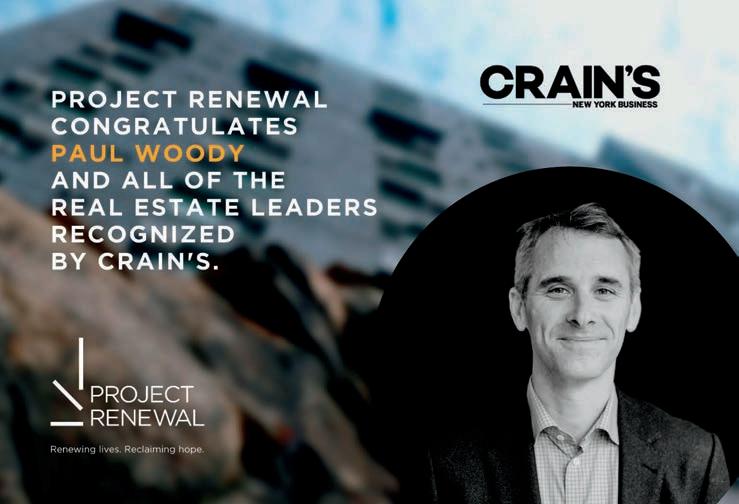
Stephens, who recently stepped down from serving on the board of directors of the literacy nonprofit Books for Kids, is involved with St. Jude’s Chil dren’s Hospital.
SEAN SZATKOWSKI Senior vice president, account manager
Skanska USA Building
At the construction and development company Skanska USA Building, Sean Szatkowski leads building operations in the New York region with a focus on critical public-sector infrastructure projects. The senior vice president and account manager provides executive oversight and guidance for the company’s project team, and he is directly responsible for Skanska’s contracted services. Under Szatkowski’s direction, the project team has managed complex construction projects, including the World Trade Center Transportation Hub, PATH Hall, MetLife Stadium, and U.N. building renovations. Szatkowski was a volunteer firefighter for eight years. He has served on the board of directors for the Building Trades Employ ers Association.
CHRISTOPHER TURNER Director of transaction services Denham Wolf Real Estate Services
At Denham Wolf Real Estate Services, Christopher Turner leads his team in navigating complex real estate transactions for nonprofit organizations across New York City and beyond. As director of transaction services for the real estate consulting firm, Turner works to secure optimal outcomes for his clients by defining their objec tives, developing solutions-based approaches, and ensuring that every transaction supports clients’ goals. To date, he has been involved in more than 8 million square feet of closed lease, sale, and financing transactions and advisory assignments across the U.S. In addition to being a mentor to numerous Denham Wolf employees, Turner is an Urban Land Institute mentor, a member of ULI NEXT, and the Chair for the RICS in North America.

42 | CRAIN’S NEW YORK BUSINESS | NOvEmBER 14, 2022
THOMAS VECCHIONE Managing principal Vocon
As managing principal at the New York office of the architectural and design firm Vocon, Thomas Vecchione advises leading corporations and real estate investors in planning and positioning their properties.
Vecchione has designed projects for a variety of sectors worldwide, including headquar ters in the Middle East, innovation hubs on the West Coast, research campuses in Europe, technology centers in Shanghai and corporate offices through out the U.S. He is a member of the board of directors of the Center for an Urban Future, the New York City Landmarks Preservation Foundation and the Real Estate Pride Council. He is an advisory board member at New York University’s Schack Institute of Real Estate.
DAVID WALKER Founder, chief strategic officer The Agency
David Walker founded the boutique real estate brokerage






The Agency. As its chief strategic officer, Walker leads the brokerage in investor relations, innovation direction, product vision and technology strategy. While he was chief operating officer of the former Triplemint, Walker grew that firm’s team to more than 300 agents, achieved more than $1 billion in sales volume in 2021, and led Triplemint’s recent merger with The Agency. He has been recognized by multiple industry publications, including Forbes in 2017 and Crain’s in 2021. Since Triplemint’s merger with The Agency, Walker has been involved in the firm’s philanthropic efforts with Giveback Homes.
WINTHROP WHARTON
Executive director of development BFC Partners
At the real estate development agency BFC Partners, Winthrop Wharton manages all aspects of development, including evaluation of new investment opportunities, project budgeting, debt and equity transactions, design and construction management, and the execution of joint venture deals. The agency’s executive director of development and investment works to support the firm’s goal of investing in residents and extending affordability to include residents’ ability to remain in their homes. To date, he has successfully closed on more than $4 billion in transac tions. Wharton is a member of the Urban Land Institute, the American Real Estate and Urban Economics Association and the Young Leaders Council of the New York Housing Conference.
PAUL WOODY Vice president of
real estate
Project
Renewal
Woody leads the real estate pipeline for the city-based nonprofit Project Renewal. As vice president of real estate, he is responsible for the develop ment of housing units made available to homeless or formerly homeless New Yorkers. Woody is leading four new construction projects that will provide supportive housing units and purpose-built shelter beds. In addition, he is redeveloping a Project Renewal-operated, city-owned 7-story shelter in Midtown East. Woody, who was instrumental in the opening of the affordable housing project Bedford Green House, is building committee chair of the Fort Tryon Jewish Center, an independent synagogue in Washington Heights.
 BENTLEY ZHAO Chairman & CEO
BENTLEY ZHAO Chairman & CEO
New Empire
Chairman and Chief Executive Officer Bentley Zhao of the development and construction management firm New Empire has guided the renovation, construction and sale of more than 120 multifamily projects. Zhao focuses on property sourcing and unit marketing while prioritizing an investorand partner-focused approach. Thanks in part to Zhao’s navigation of the city market, New Empire Corp. has identified optimally located sites, adding more than 2,000 units to its residential portfolio and development pipeline. Zhao, a devoted community leader, is an honorary professor at Huali College and a founding chair of the Asian Commercial Real Estate Association.
November 14, 2022 | CrAIN’S NeW YorK bUSINeSS | 43
ServicesfortheUnderServed congratulates ArloMonellChase 2022NotableRealEstateLeader AsSeniorVicePresidentofRealEstate Development,Mr.Chaseisleadingthe dramaticexpansionofS:US’roleasa developerofaffordableandsupportive housinginNewYorkCity. TheS:USboard,staffandourcommunity joinincongratulatingyouonthis well-deservedhonor. www.sus.org
Paul
Showcase Industry Leaders and Their Careers RECOGNIZE TOP ACHIEVERS IN ’S PREMIER PUBLICATION PROMOTIONS SPECIAL ACKNOWLEDGEMENTS BOARD APPOINTMENTS NEW HIRES RETIREMENTS MAKE AN ANNOUCEMENT! Debora Stein | dstein@crain.com Submit a listing and be a part of this exclusive opportunity. NEARLY 70% OF CRAIN’S AUDIENCE READ TO STAY INFORMED ABOUT INDUSTRY LEADERS NE W YORK
Notice of Formation of TOMPKINS TERRACE HOUSING GP, LLC
Arts. of Org. filed with Secy. of State of NY (SSNY) on 10/03/22.
Office location: NY County. Princ. office of LLC: 30 Hudson Yards, 72nd Fl., NY, NY 10001. SSNY designated as agent of LLC upon whom process against it may be served. SSNY shall mail process to Corporation Service Co., 80 State St., Albany, NY 12207.
Purpose: Any lawful activity.
Notice of Qualification of FARALLON OVERLOW GP II, L.L.C.
Appl. for Auth. filed with Secy. of State of NY (SSNY) on 10/20/22.
Office location: NY County. LLC formed in Delaware (DE) on 09/10/19. SSNY designated as agent of LLC upon whom process against it may be served. SSNY shall mail process to c/o Corporation Service Co. (CSC), 80 State St., Albany, NY 12207-2543.
DE addr. of LLC: c/o CSC, 251 Little Falls Dr., Wilmington, DE 19808. Cert. of Form. filed with Secy. of State, 401 Federal St., Dover, DE 19901.
Purpose: Any lawful activity.
Notice of Qualification of PARFUM FRANCIS KURKDJIAN, LLC
Appl. for Auth. filed with Secy. of State of NY (SSNY) on 08/10/09.
Office location: NY County. LLC formed in Delaware (DE) on 07/20/09. SSNY designated as agent of LLC upon whom process against it may be served. SSNY shall mail process to c/o Corporation Service Co., 80 State St., Albany, NY 12207-2543. DE addr. of LLC: 2711 Centerville Rd., Ste. 400, Wilmington, DE 19808.
Cert. of Form. filed with Secy. of State, DE, John G. Townsend Bldg., 401 Federal St. - Ste. 4, Dover, DE 19901.
Purpose: Any lawful activity.
PUBLIC & LEGAL NOTICES
Notice of Qualification of FARALLON HOLDCO, L.L.C.
Appl. for Auth. filed with Secy. of State of NY (SSNY) on 10/20/22.
Office location: NY County. LLC formed in Delaware (DE) on 11/09/15. SSNY designated as agent of LLC upon whom process against it may be served. SSNY shall mail process to c/o Corporation Service Co. (CSC), 80 State St., Albany, NY 12207-2543.
DE addr. of LLC: c/o CSC, 251 Little Falls Dr., Wilmington, DE 19808. Cert. of Form. filed with Secy. of State, 401 Federal St., Dover, DE 19901.
Purpose: Any lawful activity.
Notice of Formation of TOMPKINS TERRACE DEVELOPER, LLC
Arts. of Org. filed with Secy. of State of NY (SSNY) on 10/03/22.
Office location: NY County. Princ. office of LLC: 30 Hudson Yards, 72nd Fl., NY, NY 10001. SSNY designated as agent of LLC upon whom process against it may be served. SSNY shall mail process to Corporation Service Co., 80 State St., Albany, NY 12207.
Purpose: Any lawful activity.
MCGOMER REALTY LLC.
Notice of Qualification of MENAI MARKETS LLC
Appl. for Auth. filed with Secy. of State of NY (SSNY) on 10/03/22.
Notice of Formation of TOMPKINS TERRACE HOUSING CLASS B, LLC
Arts. of Org. filed with Secy. of State of NY (SSNY) on 10/03/22. Office location: NY County. Princ. office of LLC: 30 Hudson Yards, 72nd Fl., NY, NY 10001. SSNY designated as agent of LLC upon whom process against it may be served. SSNY shall mail process to Corporation Service Co., 80 State St., Albany, NY 12207.
Purpose: Any lawful activity.
Notice of Qualification of FARALLON ASIA (GP) II, L.L.C. Appl. for Auth. filed with Secy. of State of NY (SSNY) on 10/20/22. Office location: NY County. LLC formed in Delaware (DE) on 11/13/11. SSNY designated as agent of LLC upon whom process against it may be served. SSNY shall mail process to c/o Corporation Service Co. (CSC), 80 State St., Albany, NY 12207-2543.
DE addr. of LLC: c/o CSC, 251 Little Falls Dr., Wilmington, DE 19808. Cert. of Form. filed with Secy. of State, 401 Federal St., Dover, DE 19901. Purpose: Any lawful activity.
Arts. of Org. filed with the SSNY on 08/25/22. Office: New York County. SSNY designated as agent of the LLC upon whom process against it may be served. SSNY shall mail copy of process to the LLC, 139 Centre Street, Unit 818, New York, NY 10013.
Purpose: Any lawful purpose.
Notice is hereby given that a license, number 1345855 for onpremise beer, wine, cider and liquor has been applied for by Restaurant Services and Technology, LLC - DBA Bumblerella, a Jazz Club for onpremises consumption under the Alcohol Beverage Control Law at 212 East 52nd Street, New York, NY 10022.
Office location: NY County. LLC formed in Delaware (DE) on 07/31/20. Princ. office of LLC: 520 Madison Ave., 21st Fl., NY, NY 10022. SSNY designated as agent of LLC upon whom process against it may be served. Original addr. of process was Corporation Service Co., 251 Little Falls Dr., Wilmington, DE 19808; however, as amended by Cert. of Change filed with SSNY on 10/19/22, SSNY shall mail process to c/o Corporation Service Co., 80 State St., Albany, NY 12207-2543. DE addr. of LLC: 251 Little Falls Dr., Wilmington, DE 19808. Cert. of Form. filed with Secy. of State, 401 Federal St., Dover, DE 19901.
Purpose: Digital asset financial services provider.
Notice of Formation of LAUREN J. HOFFMAN PSYCHOLOGY, PLLC
Arts. of Org. filed with Secy. of State of NY (SSNY) on 10/07/22.
Office location: NY County. SSNY designated as agent of PLLC upon whom process against it may be served. SSNY shall mail process to Corporation Service Co., 80 State St., Albany, NY 12207-2543.
Purpose: Practice of psychology.
Advertising Section
CLASSIFIEDS Contact Suzanne Janik at 313-446-0455 or email: sjanik@crain.com
NOVEMBER 14, 2022 | CRAIN’S NEW YORK BUSINESS | 45
Get your message in front of New York’s influential business community with Crain’s New York Business - Classified Ads Advertising Section To place a classified ad, Call 212-210-0189 or Email: jbarbieri@crainsnewyork.com SUBMIT YOUR BUSINESS CLASSFIEDS TODAY CLASSIFIEDS
“I believe the governor understands the need for balance and common-sense solutions,” said Community Housing Improvement Program Director Jay Martin, “because despite her victory, a clear message was sent by voters.”
Prominent housing issues for Hochul’s upcoming term are likely to include a replacement for the now-expired 421-a program, which gave developers a tax bene t in exchange for including a ordable housing units in their projects, and “good cause” eviction, which would require landlords to provide a good reason when they refuse to renew tenants’ leases. Both were prominent issues this spring as well, but legislators ended the session with both unresolved.
Work on these issues would take place as the city deals with its most severe housing crisis in a generation, with problems ranging from record-high rents to an overburdened shelter system. In short, Hochul and the Legislature have their work cut out for them when it comes to housing policy.
“Hopefully, now that we’re past the election, people will recognize that we need to have a collaborative approach to our economic future in the city and that real estate is an integral part of that,” said James Power, a partner at the law rm Kramer
Levin who focuses on real estate. “And we can get past the animosity toward the industry and adopt some concrete proposals toward a ordable housing and toward bringing the city back from the pandemic.”



A
421-a
revival?
Although e orts to replace the 421-a tax break zzled earlier this year, many in the industry are more bullish on the prospects for a deal in 2023, in part because it is not an election year, making politicians more likely to take action on the controversial program.
“I don’t know what it’ll look like. I don’t know how it ultimately makes its way through the Legislature,” said Joy Construction Principal Eli Weiss, a prominent a ordable housing developer in the city. “But not having any type of abatement to create rental housing with an affordable component is not a good
outcome for New York.”
Hochul tried to replace the program with a similar one dubbed 485w but was unsuccessful. Critics of the tax break celebrated its demise, viewing it as a needless giveaway, but developers insist the economics of building a ordable housing in the city do not work without it.
And it still might not have a smooth path to coming back. With the state facing large budget de cits for the next few years, it’s hard to see the Legislature suddenly warming to the idea of reinstating tax breaks for property owners and developers, according to Martin.
When it comes to other housing issues, Jessica Katz, the city’s chief housing o cer, has said advocating for bills that would make it easier for homeowners to legalize basement apartments and build accessory dwelling units will be major priorities for the city next year, while pass-
ing good cause eviction remains a major goal for tenant advocates.
City Comptroller Brad Lander, who has championed using the 421-a expiration as a jumping-o point for broader property tax reform, predicted Albany would stay focused on creating homes for New Yorkers in general.
“ ere’s reason to imagine that housing will be a critical issue broadly next session,” he said. “I don’t know how much that has to do with the results so much as it just remains a very serious issue.”
Big bets
e Hochul administration also will be focused on its controversial Penn Station redevelopment plan and e orts to bring a casino into the city.
ough Zeldin was vague on his housing policy plans during the campaign, he did take jabs at Hochul’s Penn Station project, calling it “deeply awed” and a “boondoggle” that would waste tax dollars.
Vornado Realty Trust, the main developer for the plan, has delayed work on it, but Hochul’s administration continues to fully support it, betting that the tax revenue collected from the 18 million square feet that’s going to be developed will help pay for the rebuilding of Penn Station itself.
Vornado is also vying for a coveted casino license now that the state is allowing for three to be built downstate, as are real estate giants e Related Cos. in Hudson Yards
and SL Green in Times Square. Lawmakers supporting these projects, including Hochul, say they are looking forward to the taxes that will be collected from them once they’re built and the jobs they’ll create during construction and beyond.
e fee to secure a license will be $500 million, which will go directly to the state, and the winners will be chosen by a state-appointed board. Weiss said he feels optimistic in general about the real estate policies likely to come from the Hochul administration in the wake of her victory.
“Ultimately, she seems like a very pragmatic governor,” he said, “and now that she’s won election, she has the wind at her back to try to get things done.”
Hochul received campaign contributions from some of the city’s most prominent real estate gures, including Vornado’s Steven Roth, Related’s Stephen Ross and Silverstein Properties’ Larry Silverstein.
Brett Gottlieb, a partner and real estate attorney at Herrick Feinstein, stressed that the governor would have plenty of non-housing issues to focus on but that she is someone the industry can work with.
“We’re going to have to see what the governor prioritizes because obviously there’s other issues outside of real estate she wants to throw her back into,” he said. “I do know that she is a supporter of the real estate industry, as they have been of her.” ■
Asian neighborhoods of Brooklyn and Queens. Despite being an unapologetic Donald Trump supporter, he ran better than any GOP gubernatorial candidate in 20 years. Central to Zeldin’s pitch was repealing all the criminal justice reforms passed in 2019. Zeldin ran on restoring cash bail for all o enses and lowering the age, once again, of criminal responsibility. Now defendants can be tried as adults starting at age 18, whereas before it was age 16.
Zeldin railed against state laws that limited solitary con nement. He vowed to drag the Manhattan district attorney, Alvin Bragg, from o ce. If he didn’t win, he at least found an audience—a signi cant chunk of the electorate seemed receptive to his message on public safety.
How will Hochul respond to these results? She arguably owes her win to the left. e Working Families Party, after opposing Hochul in the primary, staged a getout-the-vote e ort on her behalf. While the WFP can’t take sole credit for her win, it was a much-needed group in the nal days of the campaign, doing more visible pro-Hochul organizing work than the state Democratic Party.

e many WFP-aligned Democrats in the Legislature, as well as the outright socialists, will have demands. Another ght is set to break out over the “good cause” eviction
bill, which would limit rent increases and make it harder for tenants to be evicted. e real estate industry is wholly opposed to it, and moderate Democrats are wary of the bill. But it has the votes in the Senate and is creeping closer to acceptance in the Assembly.
Hochul herself has been noncommittal; if she embraces “good cause,” many of her largest donors are bound to be furious. If the bill fails, progressives and pro-real estate Democrats may at least unite around legislation to create a new statewide housing voucher program for the homeless. e bill was widely popular but opposed, on cost grounds, by Hochul. We may expect another push around the Housing Access Voucher Program next year.
Beyond the homeless, Hochul abandoned an effort last year to build more housing in the suburbs, where limited supply has driven up costs. With the election over, will Hochul regain her appetite for a ght over loosening zoning restrictions in towns where nearly all development is reviled? California has been doing just that, and Hochul will have to consider whether she wants to follow the Golden State’s lead or bow to entrenched political opposition.
Suburban swing
Some Democrats in the Legislature are probably spooked by how well Zeldin performed in the swing regions of the Hudson Valley and Long Island. Among moderate Democrats, there will likely be calls for Hochul and the Legislature to
further weaken the 2019 reforms. Earlier this year Hochul forced the Legislature to accept adding new o enses that were eligible for cash bail. She also agreed with Mayor
not weaken their hands signicantly. ough the Assembly bled more Democrats than it has in a while, the Democrats are still set to retain their veto-proof supermajority. Depending on the outcome of two close races in the Senate, Democrats could keep their supermajority there too.
Orthodox vote
Orthodox Jews came out in full force for Zeldin. Turnout in the heavily Jewish neighborhoods and towns of the state was remarkable. Most were animated by the potential for Hochul and state lawmakers to crack down on Hasidic yeshivas, which have been accused of teaching substandard levels of English, mathematics and science. So far Hochul has declined to act, doing what most Democrats in power have historically done when it came to these yeshivas: Look the other way. e Orthodox vote was potent enough to possibly persuade Hochul to keep the status quo. Reformers within the Hasidic community want her to act, as do liberals in the education movement beyond the a ected communities. Hochul will have serious decisions to make.
Eric Adams to dispatch more police on the subways. None of this, though, could appease the many Republicans and dissident Democrats who supported Zeldin.
As Black lawmakers sensitive to police overreach, Speaker Carl Heastie and Senate Majority Leader Andrea Stewart-Cousins strongly support criminal-justice reforms. Zeldin’s strong showing did
At the minimum, there will be 40 Democrats next year in the 63-member Senate, a large number that will not be easily swayed by forces on the right. Many of the Democrats most wary of bail reform, in the Senate at least, lost their races. It’s plausible that Hochul, in the next budget, could apply pressure to chip away at the 2019 laws, perhaps forcing Democrats to accept allowing judges to
And then there is the court. Hochul still needs to appoint a replacement for Janet DiFiore, the chief judge of the Court of Appeals, the state’s highest court. DiFiore was a relative conservative and a close ally of the disgraced former governor, Andrew Cuomo. Progressive activists want a more liberal judge, and many Senate Democrats, who must con rm Hochul’s pick, agree. Still, the Senate has historically done what the governor wants, and Hochul may hunt for another centrist or someone in the DiFiore mold.
With campaigning nally done, Hochul will have a chance to consider what she wants the next four years to actually look like.

46 | CRAIN’S NEW YORK BUSINESS | NOVEMBER 14, 2022
HOPES FROM PAGE 1 NEWSCOM
HOCHUL became the rst woman elected to New York’s governor seat.
apply a “dangerousness” standard when deciding whether to jail defendants.
CENTRAL TOZELDIN’S PITCH WAS REPEALING CRIMINAL JUSTICE REFORMS ROSS BARKAN LEVERAGE FROM PAGE 1 NEWSCOM REAL CONTEST: The governor’s race was relatively close for New York.
■
Levain builds neighborhood approach into expansion plan
BY CARA EISENPRESS
If there is a recipe for building a popular New York City food company into a national brand, co-founders Pam Weekes and Connie McDonald and CEO Andy Taylor have not cooked by the book.

“ e goal wasn’t this,” said Weekes, meaning Levain’s headquarters on East 33rd Street, where sales managers sit in the middle of a mostly open o ce, and the 11 stores in four regions that turn out hundreds of thousands of oversize cookies each week. “It was to have 74th Street, a nice neighborhood bakery. Bake bread, build the community.”
Weekes and McDonald started Levain Bakery in 1995. e two were friends, foodies and triathlon competitors, both restless with corporate jobs. McDonald jumped to the restaurant industry, and when a site where she worked closed down, she and Weekes took over the kitchen there and began selling bread through wholesale accounts.
Six months later a friend saw a lower-level retail space on West 74th, and Levain Bakery’s loaves, brioche and, most of all, giant cookies became the best-kept secret on the Upper West Side.
“We knew everyone on the block,” Weekes said. “Everyone who was born on the block worked at that bakery.”

In October 1997 New York Times food reviewer Amanda Hesser wrote about the cookies, then $1.75, and buzz built. By 1999 the company had started a mail-order business with an early website, and by 2000 the second location had opened, in Wainscott, in the Hamptons. e success grew, and when the Food Network called for a throwdown with Bobby Flay, the bakers, who loved their entire selection of baked goods, had to admit that cookies were what they were selling.
But to build a business o a cookie, even one that weighs nearly half a pound and whose price recently hit $5, you have to sell a lot of them, and there was tension between the bakers’ vision of being a cozy, sweet-smelling bakeshop and the push to nd a smart road for growth and exploit economies of scale.
Investors reached out frequently, but discussions did not pan out for years. “It wasn’t the right t,” McDonald said. “We didn’t want someone whose interest was in making money,” Weekes added. Still, the duo was realistic about the need to grow more e ciently. Without a clear management structure, busy holiday seasons were exhausting. Valuable sta would leave for other companies because they didn’t see a clear path forward. Saving enough to open a new location took about ve years.
In 2018 Levain Bakery sold a majority stake to Chelsea-based Stripes, a private equity rm, for an undisclosed amount.
From there, growth became a lot less glacial, and a management structure was implemented to help nurture and retain talent, a relief to both Weekes and McDonald, who remain heavily involved in menu development and the nitty gritty of each bakery. e rm operates a commissary in Long Island City for e-commerce orders and dough making, but all the baking is done in each bakery. “We bake everything all day long, and we never run out,” said McDonald.
Not every venture has gone perfectly, though: e math for last year’s launch of 2-ounce balls of dough that consumers could buy at grocery stores and bake at home did not work out as costs of ingredients soared. Since the Stripes investment, total revenue has increased vefold, the company said, and e-commerce sales have gone up by a factor of 12.
Location, location, location
at leaves the cookie company back where it started, in a way. Retail comprises 80% of all sales, but it can take years for the trio to nd exactly the right places to set up shop, said Taylor, who joined as CEO when the Stripes acquisition closed.
“If you wanted to, you could build X number a year,” he said. “I didn’t want to just put dots on a map.”
For example, the company decided that Newbury Street in Boston would be a prime site, but the way the street is constructed means that most retailers are either above or below grade. Levain wanted a store exactly on ground level. One appeared, but it still wasn’t exactly right. Yet the company was so dedicated to the perfect location that it negotiated to have the landlord raise the building by 2 inches in order to make a back area usable.

e company opened the Boston location this year, as well as one in Chicago; a site in Los Angeles is due to begin its build-out soon. e rm is hunting for more sites in Los Angeles and perhaps an eighth New York City location, with the goal of around 20 stores total by 2025. e team, however, is picky.
“We see a lot of sites and pass on the majority,” Taylor said. ■
FOCAL POINTS
NOVEMBER 14, 2022 | CRAIN’S NEW YORK BUSINESS | 47 SMALL-BUSINESS SPOTLIGHT
The famed giant cookie maker is unabashedly picky about where it chooses to set up shop
COMPANY NAME
FOUNDED 1995 FULL-TIME EMPLOYEES 300, of which 40 are on the cookie-making team FOUNDERS Pam Weekes and Connie McDonald GROWTH STORY
friendly experience
buying a freshly baked cookie straight from a bakeshop. By streamlining internal structures, the company is able to sell tens of thousands of freshly baked cookies at individual shops as well as maintain a large-scale e-commerce business. REVENUE Declining to give a speci c gure, Levain says its revenue has grown vefold since 2018. Though cookies do not account for all its sales, the NoHo location, for example, typically sells 40,000 cookies, now at $5 each, per week. PRODUCT MIX Enormous cookies in signature avors including chocolate-chip walnut as well as brioche, whole grain loaves and banana chocolate chip loaf cakes WEBSITE levainbakery.com
Levain Bakery
Rather than become an omnipresent brand, Levain has focused on the warm and
of
EVERYONE
AT THAT BAKERY”
“
WHO WAS BORN ON THE BLOCK WORKED
LEVAIN
BAKERY’S Taylor, McDonald and Weekes
BUCK ENNIS







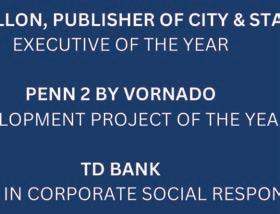


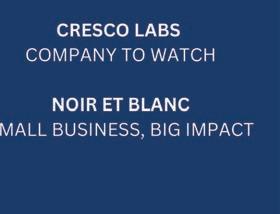






































 BY GARY LABARBERA
BY GARY LABARBERA


























 INTERVIEW BY BRIAN PASCUS
INTERVIEW BY BRIAN PASCUS











































 David R. Jones, Esquire President and Chief Executive Of cer
Steven L. Krause Executive Vice President and Chief Operating Of cer
Magda Jimenez Train Vice Chairperson
Jerry Webman Treasurer
Joseph J. Haslip Secretary
Stephen R. Aiello, Ph.D. Honorary Life Trustee
Terry Agriss Chair of the Governance & Nominating Committee
Karen Bitar Chair of the Development Committee
Jeffery Weaver Chair of the Investment Committee
CSS rallies in support of legal representation for tenants in housing court. Our data shows the Right to Counsel program to be highly e ective at preventing evictions. Photography by Katie Nuñez/Phe Studios
CSS provides urgent support to people facing nancial hardship, including the threat of eviction. We helped Deborah (pictured) pay rent when she fell behind a er a hospital stay. Photography by Katie Nuñez/Phe Studios
David R. Jones, Esquire President and Chief Executive Of cer
Steven L. Krause Executive Vice President and Chief Operating Of cer
Magda Jimenez Train Vice Chairperson
Jerry Webman Treasurer
Joseph J. Haslip Secretary
Stephen R. Aiello, Ph.D. Honorary Life Trustee
Terry Agriss Chair of the Governance & Nominating Committee
Karen Bitar Chair of the Development Committee
Jeffery Weaver Chair of the Investment Committee
CSS rallies in support of legal representation for tenants in housing court. Our data shows the Right to Counsel program to be highly e ective at preventing evictions. Photography by Katie Nuñez/Phe Studios
CSS provides urgent support to people facing nancial hardship, including the threat of eviction. We helped Deborah (pictured) pay rent when she fell behind a er a hospital stay. Photography by Katie Nuñez/Phe Studios


































 e ird Annual Second Chance Experience event on October 20 honored the work of activists committed to criminal justice reform and celebrated the accomplishments of AFJ’s Participants.
Angel Rodriguez Executive Director
Alanna Rutherford Board Chair
e ird Annual Second Chance Experience event on October 20 honored the work of activists committed to criminal justice reform and celebrated the accomplishments of AFJ’s Participants.
Angel Rodriguez Executive Director
Alanna Rutherford Board Chair

































































 JASON BORDAINICK
JASON BORDAINICK







 Partner, co-chair of the global real estate industry group Goodwin Procter
Partner, co-chair of the global real estate industry group Goodwin Procter











 JOE FERRARA Principal BFC Partners
JOE FERRARA Principal BFC Partners



 JEFFREY GOLDBERG CEO Fairstead
JEFFREY GOLDBERG CEO Fairstead


 CEO Time Equities
CEO Time Equities













 TED HUNTER Partner Manatt, Phelps & Phillips
TED HUNTER Partner Manatt, Phelps & Phillips



 JAMES JOHNSON-PIETT Founding Principal & CEO Urbane
JAMES JOHNSON-PIETT Founding Principal & CEO Urbane


 SAYO KAMARA Senior associate Cushman & Wakefield
SAYO KAMARA Senior associate Cushman & Wakefield




 PHILIP LANG
Co-founder, chief business officer The Agency
PHILIP LANG
Co-founder, chief business officer The Agency


























 JOSHUA RINESMITH Partner Akerman
JOSHUA RINESMITH Partner Akerman

















 BENTLEY ZHAO Chairman & CEO
BENTLEY ZHAO Chairman & CEO






















